








It’s where the heart is. Hospitality, traditions, homemade apple tart, and a trip to Holland come together for one warm issue all about welcome.


















It’s where the heart is. Hospitality, traditions, homemade apple tart, and a trip to Holland come together for one warm issue all about welcome.








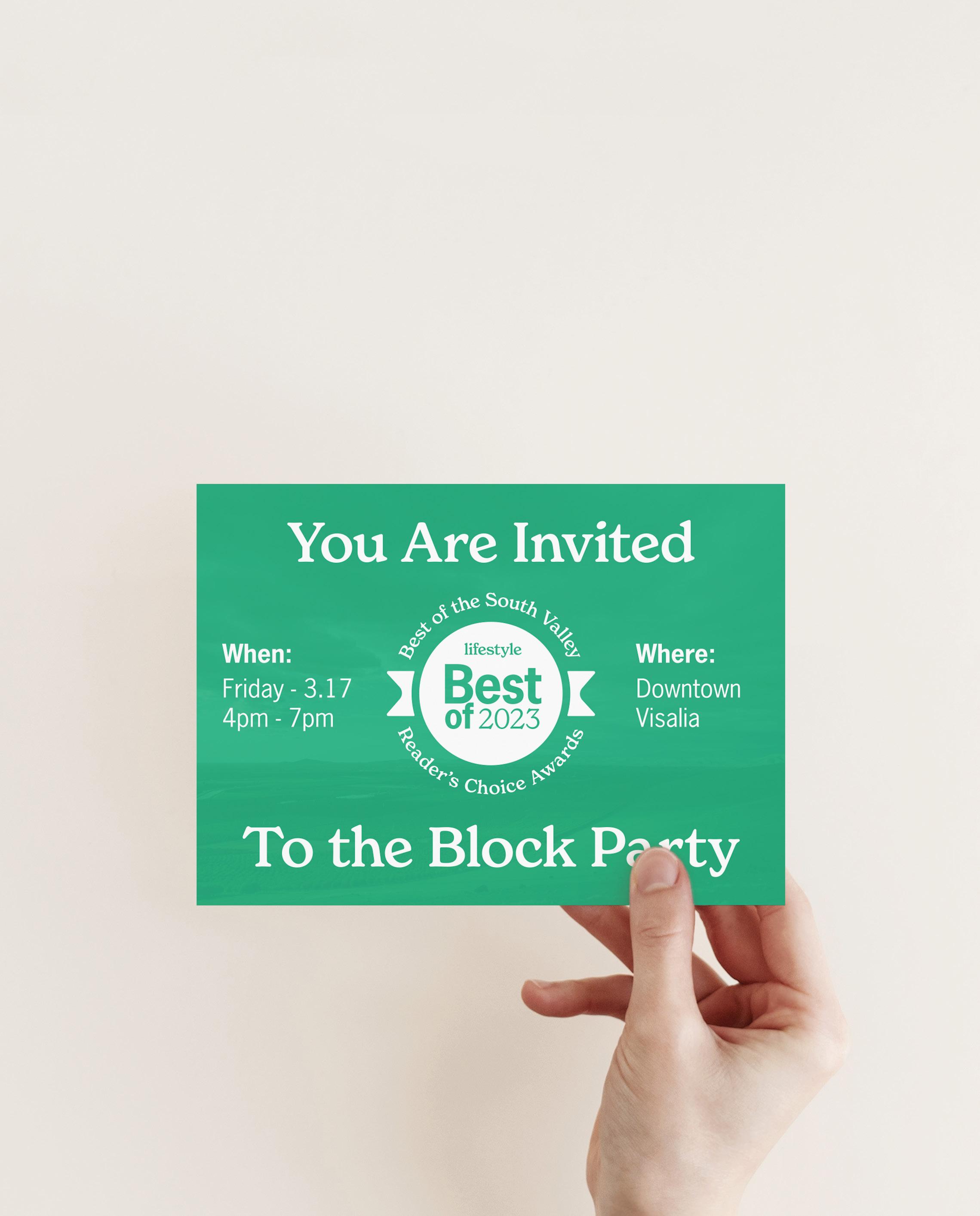
We are overwhelmed by the excitement and response to our first “Best Of” awards. We’ve had thousands of people vote for their favorite local businesses and now we are eager to announce the winners.
So, come out on Friday, March 17th (St. Patrick’s Day) to downtown Visalia and join us for the award party.
Friday, March 17th
“Where are you from?” is one of the most commonly asked introductory questions we have in our conversational lexicon. With the answer to that simple question we find out that a person was born in another country, or right down the street. We discover that we went to the same school or they moved here in the 5th grade. Or we’re able to discern that the person’s accent is actually South African, not Australian (I always get those mixed up). Understanding where people are from gives us great insight about who they are.
I most often tell people “I’m from here” when first introduced. The “here” I’m referring to is Visalia, Tulare County, California. I’m a fourth-generation Visalian, which, like many kids with a “small town” heritage, is not something I was always proud to say. I was eager to see what else was available beyond the place I grew up. So as an 18-year-old I joined a Christian missionary organization and set out for two years, traveling back and forth across the United States and Canada four times. I stayed in a new town or city every night and met over 100 different families that would graciously let me crash in their spare bedroom or on their sofa. It was a hoot to spend time with people from incredibly diverse backgrounds and histories.
During this period of life, I also had the opportunity to travel abroad to 10 vastly different countries. I was able to spend weeks traveling through western India, skiing the Swiss Alps, visiting villages on the outskirts of Port-Au-Prince, snorkeling in the Virgin Islands, and marching with thousands in the streets of San Jose, Costa Rica when their local soccer team won the championship. I now realize that this type of life experience was a unique privilege and the joy of a lifetime for this small-town kid. Yet, one of the deep deposits in me was an immense love for home.
In that short span of years, I packed in a lifetime of experiences that helped to ground and shape me as a man. But one thing that was evident in it all was the fact that I was a visitor. I was a sojourner, passing through someone else’s home. My home was in Central California.

Since then, I’ve often thought about what it means to be at home. It’s a question I’ve reflected on as a son and now as a father, as a friend, a citizen, and a steward. And what I’ve come to realize is that home is built. It’s cultivated and tended to. It’s planned and watched over. Building a home takes time, love, and attention. Home is a shared experience that we each have a unique role in creating and caring for.
Whatever experiences and opportunities our individual lives have provided for us, we each get a chance to build a place around us that is safe and full of love, welcomes people, fosters true connection, and makes room for people to be at ease. We all need a place like this in our lives. My hope for our communities (and for my life) is that we become the kind of people that create places like these: beautiful homes.
Cheers,
Eric Riley Executive Editor Lifestyle Magazine President / Owner Topograph



March 2023


Scan here to read more about our monthly contributors, see a list of rack locations, or to sign up for a monthly subscription.


 Devon Brown LANDSCAPE ARCHITECT
Terry Ommen HISTORIAN
JJ Fry WEB / GRAPHIC DESIGNER / PHOTO
Natalie Caudle WRITER
Monica Fatica MANAGING EDITOR
Dakota Jacobi PHOTOGRAPHER
Mark Garcia GRAPHIC DESIGNER / PHOTOGRAPHER
Devon Brown LANDSCAPE ARCHITECT
Terry Ommen HISTORIAN
JJ Fry WEB / GRAPHIC DESIGNER / PHOTO
Natalie Caudle WRITER
Monica Fatica MANAGING EDITOR
Dakota Jacobi PHOTOGRAPHER
Mark Garcia GRAPHIC DESIGNER / PHOTOGRAPHER

Words by Lifestyle Staff
matter how big, small, elaborate, or modest a home is, the feeling of being connected emotionally with a deep sense of belonging is how people find the most meaning. Local wife, mom, and business owner Karol Anderson shares that although she prefers her home to be clean and organized, she realizes that creating an environment that evokes comfort is the most important. A home is typically a place of refuge. It’s where significant memories are built with friends and family and where one can truly be themselves. It’s where parents aim to provide stability, comfort, and connection with their children; planting these roots will lay the foundation for them to build deep relationships over time.
We may equate home with the feeling we have when we walk in the door—feeling welcomed to come “recharge” after a long day away. Adding personalized touches to your entry can create an immediate warmth and comfort. For some, that could mean a scenic piece of art reminiscent of a favorite vacation. For others, it could be seeing hints of family around the entry, like the sight of small sneakers or a cherished hat on a hook.
Living spaces can have a big impact on our social and psychological well being. Everything from color schemes to home decor to textures can affect your mood and liveliness. Creating coziness and warmth for your family to find reprieve can improve mental health. Keep plush throw blankets on hand to snuggle with on the couch during movie night, or add a comfortable oversized chair to sink into with a book in hand. Karol agrees and aims to prioritize these elements in her own home. “I’ve come to appreciate that less is truly more and to prioritize comfort over trends. Filling our home with personal elements such as our family photos creates feelings of warmth for our family.”
For many, the kitchen is the heart of the home—it’s where we gather at the beginning and end of the day. It’s where we spend our time cooking, eating, and socializing together. It’s the lifeline for some families and the time spent in this space can nurture a healthy lifestyle. The smell of freshly baked bread trailing through the house or setting out nutritious snacks when your kids get home from school will create positive memories for your family. You can incorporate more bonding opportunities by having each child assist with preparing their favorite meal throughout the week. The kitchen ties a family together no matter how busy the day to day is. For Karol’s family, this space is where they spend the most time together over a warm meal, sharing about their days, typically filled with sports and other activities. “No matter how busy we are, we somehow manage to gather in the kitchen around food. We have a family tradition of eating a hearty dinner together every Sunday, while catching up on the week’s events and planning out the next.”
For most of us, a home isn’t about the structure itself; its meaning and strength comes from the memories created. Allow your heart to take the lead when creating spaces in your home. In the process, you will find that what matters most is the people who fill it and how they feel when they are in your home.
theandersonregroup.com andersonregroupbrought to you by







Every spring season, Nowruz (pronounced no-rooz), which means “new day,” is celebrated by Persians and other nationalities in the region and around the world. The new year tradition has been observed on March 20 or 21 for more than 3,000 years and is a way to honor the beginning of spring. The celebration is filled with some of the most treasured things in life: symbolic rituals, flavorful food, well wishes, and gathering with family and friends. On March 21, 2010, the UN General Assembly officially proclaimed that date as International Nowruz Day. This year’s Persian New Year falls on Tuesday, March 21, with a variety of cultural customs that occur before and during the holiday.
Preparations are implemented 2-3 weeks prior to the holiday through rituals aimed at starting the new year with a clean slate. This is achieved through spring cleaning everything in your home, such as deep cleaning rugs, clearing cabinet interiors, and purging closets. Investing in new housewares and furniture to prepare for guests, purchasing new clothes, and buying flowers (hyacinth and tulips) are also common practices. The rituals are a symbolic way to signify leaving behind the disorder and discontent of the years past and beginning with a fresh start.
One of the most important ways to honor the holiday and launch the celebration is to prepare a Haft-sin table. In the Persian language Farsi, the word “haft” means seven and “sin” means the letter S. A Haft-sin table is created using seven “S” objects that symbolize life, health, abundance, and purity. The table may also contain items of significance to each family, but the must-have items are always included.
Words and photos by Lifestyle Staff Asiyeh Salehi poses with her Haft-sin table for this year's Nowruz.The new year holiday is stretched over 13 days in Iran. On the last Tuesday of the year, Chaharshanbeh Suri is launched with an evening of singing and enjoying a bonfire. The celebration continues with the gathering of family and friends over feasts and gift giving. Special traditional dishes are prepared using herbed rice, fish (traditionally white Bass), herb frittata and Ash Reshteh (noodle soup), greens, and fresh herbs. A beef stew with mint, lime, and celery is another favorite dish. Baking homemade cookies and pastries are a tradition that starts a few weeks before Nowruz. The final day is called Sizdah Be Dar or Nature’s Day.. During Sizdah Be Dar, Persians celebrate by taking day trips outdoors to picnic and enjoy nature.
In the day-to-day hustle, it’s easy to overlook the gift of new beginnings we are offered throughout the year. For those in our local Persian community, it can be conflicting to enjoy our privileges and freedom when consumed by worry and concern for those experiencing hardship in Iran. But with the promise of renewal that Nowruz brings, there is always hope and togetherness to be celebrated.
The local Persian community dedicates this year’s Nowruz to all the brave women and men standing up against injustice in Iran, impacted by brutal violence in opposition to the Islamic Republic. Follow their efforts of being a voice for freedom.
 Sabzeh (Wheat or sprout) Symbolizes renewal or rebirth
Senjed (Dried fruit) Symbolizes love & wisdom.
Seer (Garlic) Symbolizes self-care, health & protection in the face of adversity.
Sib (Apple) Symbolizes health & beauty
Sumac (Persian spice made from red berries) Symbolizes patience & sunrise/new day
Samanu (Sprouted sweet wheat pudding) Symbolizes fertility & the sweetness of life
Serkeh (Vinegar) Symbolizes strength
Sabzeh (Wheat or sprout) Symbolizes renewal or rebirth
Senjed (Dried fruit) Symbolizes love & wisdom.
Seer (Garlic) Symbolizes self-care, health & protection in the face of adversity.
Sib (Apple) Symbolizes health & beauty
Sumac (Persian spice made from red berries) Symbolizes patience & sunrise/new day
Samanu (Sprouted sweet wheat pudding) Symbolizes fertility & the sweetness of life
Serkeh (Vinegar) Symbolizes strength


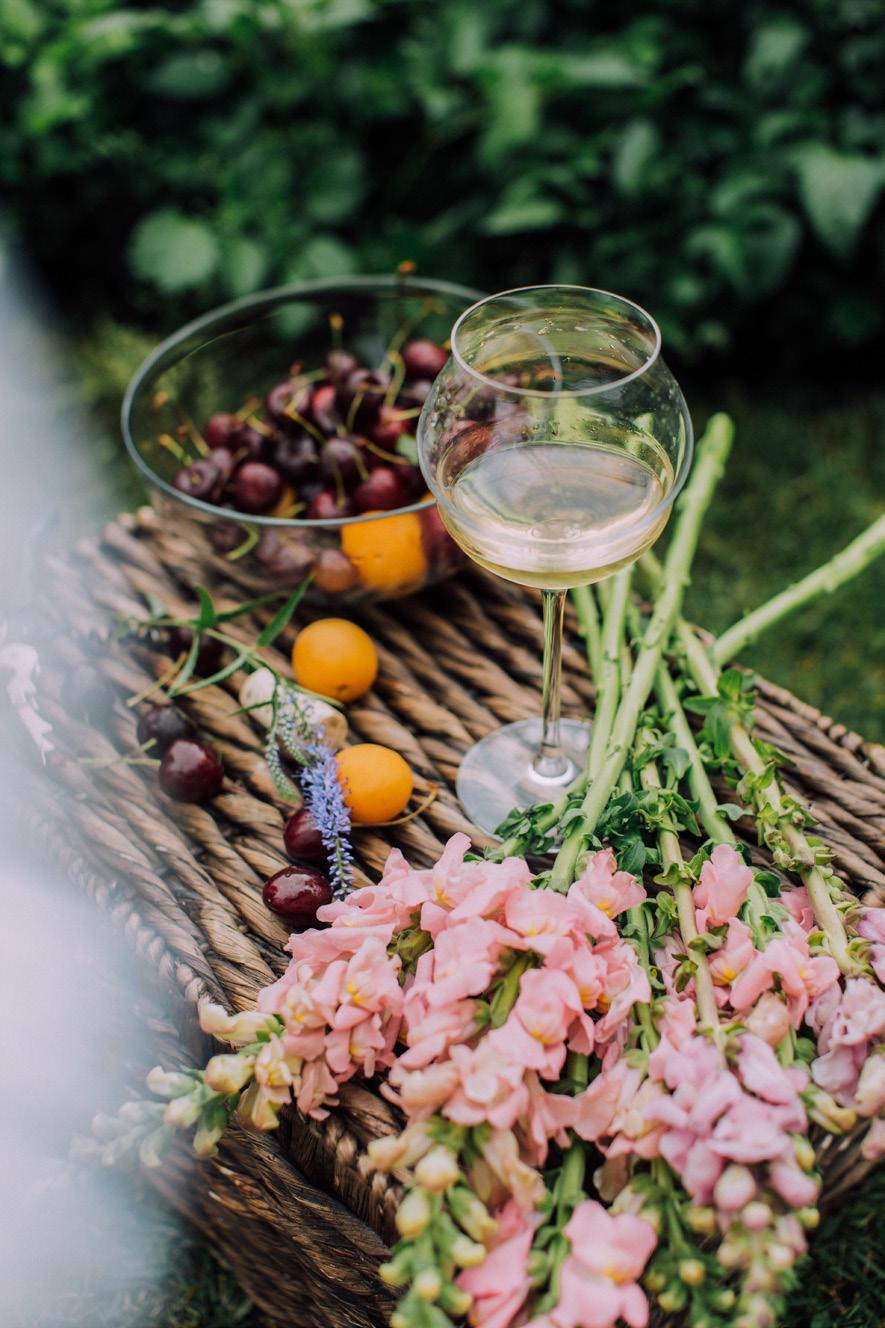
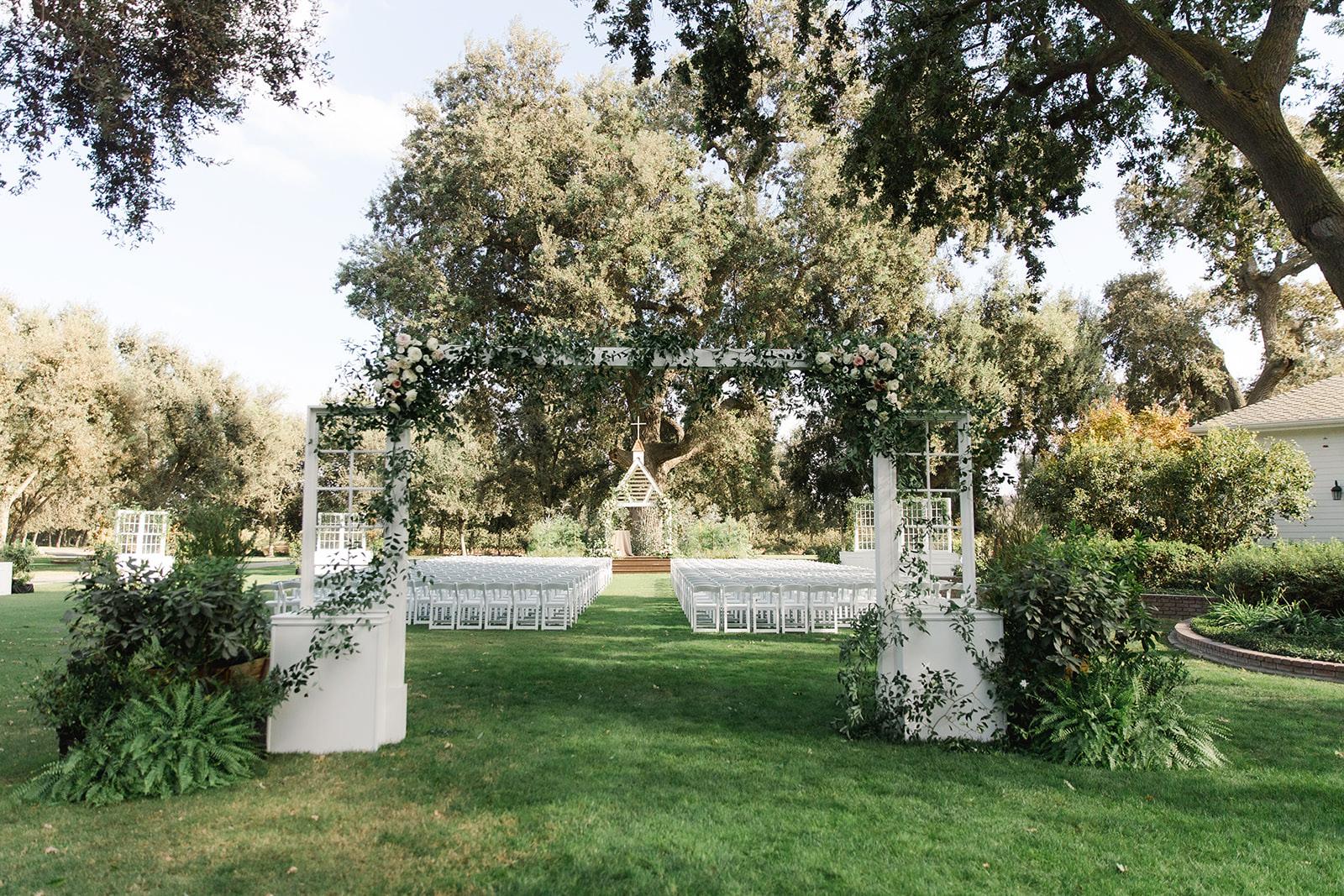


YOUR FRONT YARD IS THE FORMAL INTRODUCTION TO YOUR PRIVATE WORLD. IT WELCOMES YOU HOME EVERY DAY AND INVITES GUESTS TO YOUR FRONT DOOR. IT IS THE SEMIPUBLIC SPACE THAT SERVES AS THE MINGLING SPOT WHERE NEIGHBORS CAN GATHER AND CHILDREN CAN CHALK PAINT ON THE DRIVEWAY AND SCOOTCH AROUND ON THEIR SCOOTERS. ARE YOU GETTING THE BEST VALUE OUT OF THIS PRECIOUS PIECE OF YOUR PROPERTY? HERE ARE SOME FRONT YARDS THAT WE HAVE DESIGNED AND INSTALLED TO ADD CURB APPEAL AND USABLE SPACE FOR OUR CLIENTS.
Want to create a unique vibe as guests approach your home? This Fig Garden favorite of ours ties in a flair that is uniquely Californian. Field grown olive trees flank the poured in place concrete paver walkway while a perfectly selected tone of gravel effortlessly intermingles with the pavers and plants. A balance of textures adds a huge impact for this style. Combining the formality of boxwood orbs with the whimsical shape of ‘Blue Glow’ Agaves and the playful textures of ornamental grasses pulls this look together. What is more inviting than a shady walkway on a summer’s day in the Valley?
 Words by Devon Brown | Photos by Ella Howell
Words by Devon Brown | Photos by Ella Howell
Do you have an expansive space that feels like it quickly turns into no man’s land? You don’t want to hassle with maintenance-heavy landscaping, but you do not want a barren hard surface, either. In this Green Acres courtyard, we designed a paving pattern that creates suggestive movement while leaving it open for hubs of gatherings to happen.

For young families, it is important to leave space open to sit outside and mingle while your kids play. You have other priorities than to fuss with gardening. Keep the planting minimal , interesting, and appropriate for Valley heat and colder temperatures. Remember, it’s okay to let seasonality show. It doesn’t all have to be in bloom and showy all the time. Seasons are part of life.
The phrase famously coined by architect Louis H. Sullivan “form follows function,” gives a lot of grace to work with a space instinctually. What is the purpose? This Green Acres home effectively brings guests to the front door in a somewhat unconventional way. Without the frill of obligatory front yard sign posts, this home utilizes low retaining walls to address grade differences in the most space-efficient manner, while reinforcing the architectural qualities of the home. Hardscape was intentionally placed to allow for guest parking and pathways. While we reinforced these ideas with vegetation and landscape lighting, my favorite element of all is the oversized pottery with citrus. Nothing beats citrus trees. Bright green foliage year round and showy color from the fruit in the winter months. If you take away two ideas from this article, remember, 1) never undersize pottery, and 2) you can never go wrong with citrus trees.

Your landscape should reinforce your architectural style. In this Chardonnay home, we were able to remodel a traditional front yard into a functional and aesthetically pleasing gathering space for this super social neighborhood. We designed the height of the courtyard walls to offer some privacy, while allowing the appropriate amount of visibility to avoid feeling blocked in. Sound from the fountain is a tranquil and welcoming element , not to mention a beautiful centerpiece to balance out a portion of the courtyard that was too small for a seating area.


Pro tip: Install pipes for water and drainage (and sometimes lighting too) when installing pottery. All of our pottery is automatically irrigated. Even these small pots on the columns. Huge time saver.
We love courtyards (if I haven’t been too obvious about it yet). This is a project dear to us: our own abode. It’s a deep front lot that can feel like a distant walk from the road. We broke up the walk by implementing a raised planter, which doubles as a seating area to watch the kids live the cul-de-sac life. We then added in higher courtyard walls with a custom address sign to separate a more “private” courtyard space that we decorated with a colorful bistro set, bright pottery and of course, citrus.
Pro tip: If you are designing on a budget, hedges such as a Privet (Ligustrum texanum) can achieve a similar sense of separation as a low wall—especially when planted tightly with a 2’ to 3’ spacing.
charteroaklandscape.com
charteroaklandscape
Being in business for two decades is an impressive accomplishment, and Mitchell Insurance is proud to achieve that milestone this year. The local insurance agency gave us a glimpse into their story this month.
Q: How did Mitchell Insurance begin? What’s contributed to the company’s success?
A: Mitchell Insurance Services was established in 2003 by founder Kelly M. Mitchell. He entered the agricultural business as a PCA* from 1980 to 2003 in the San Joaquin Valley. Following in his father’s footsteps, he entered the insurance industry and started his agency. Although Kelly passed away in 2021, Mitchell Insurance Services has maintained the same level of commitment and passion that Kelly had for his clients and his staff.

Q: How has the industry changed over the years? How have you had to adapt?
A: It’s always in a state of flux, but adapting to changes and challenges is key. During times of unsettled weather or avoiding financial interruptions, we ensure our clients have the best coverage and protection for their investments. We also stay on top of crop insurance updates and FSA programs, insurance industry seminars and conventions, and yearly training. Carrier underwriting guidelines and carrier availability have changed frequently over the past few years. So: we’re searching out more carriers, products, and resources to meet the needs of our clients.
Q: What does your team enjoy most about helping clients with their insurance needs?
A: Kelly set the standard for helping his clients and their insurance needs. We hold that standard and make sure that customer service always comes first. Establishing relationships and developing a level of trust with our clients is what we strive for and enjoy the most.
Q: What would readers be surprised to learn about your company or the insurance industry?
A: Not many people know that we specialize in crop insurance, which protects farmers and our food supply. Throughout the U.S., crop insurance protects 490 million acres, covers more than 130 different crops, insures over $173 billion in food, fuel and fiber, and safeguards over $6 million in farmer-paid premiums. California crops contribute $45.2 billion to the economy, including grapes, almonds, and lettuce.
Q: Is there anything on the horizon for Mitchell Insurance?
A: From 2003 to 2023, we have maintained the same level of commitment to our clients as our founder Kelly did, and we will continue to do so in the future.

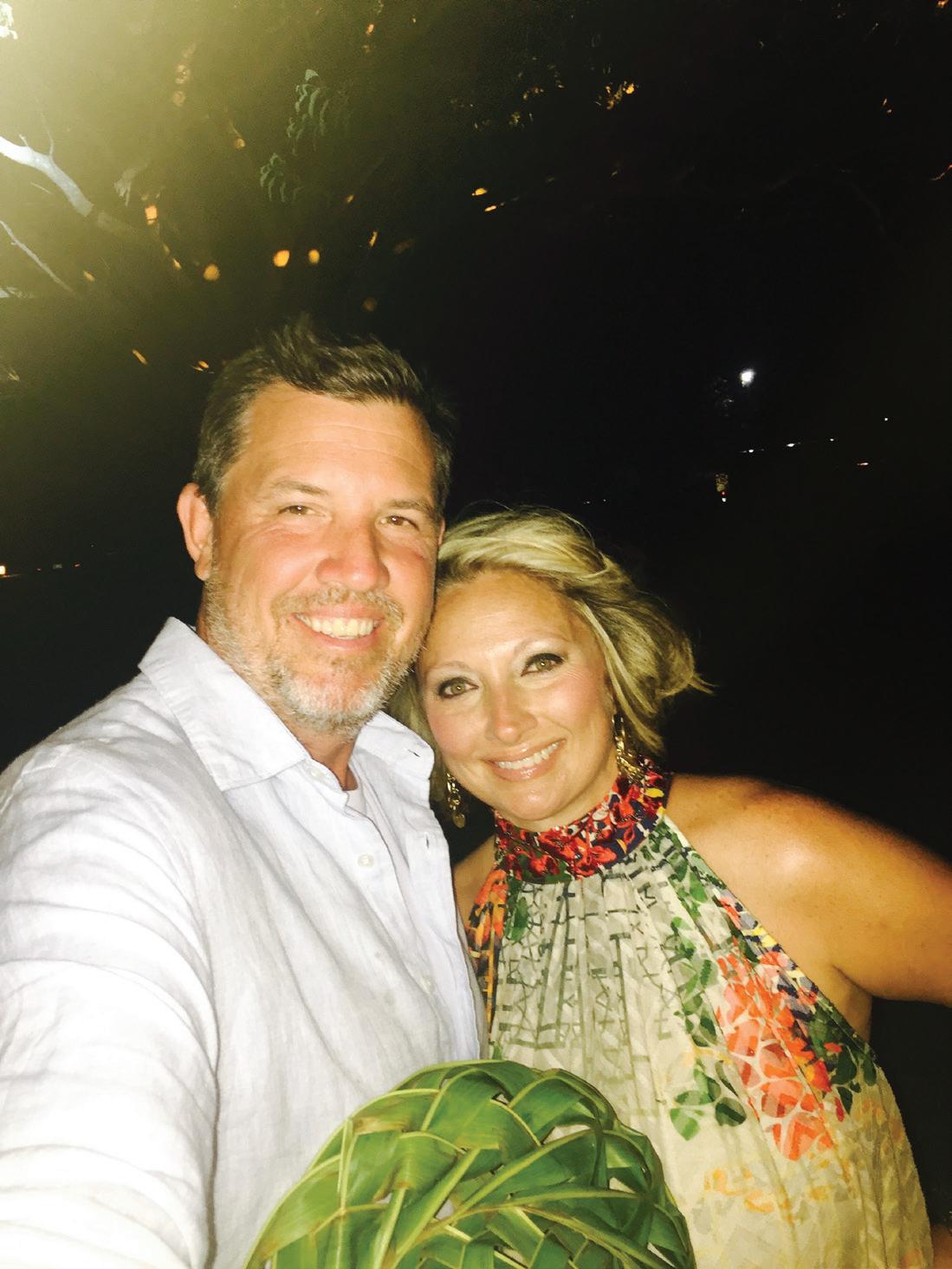


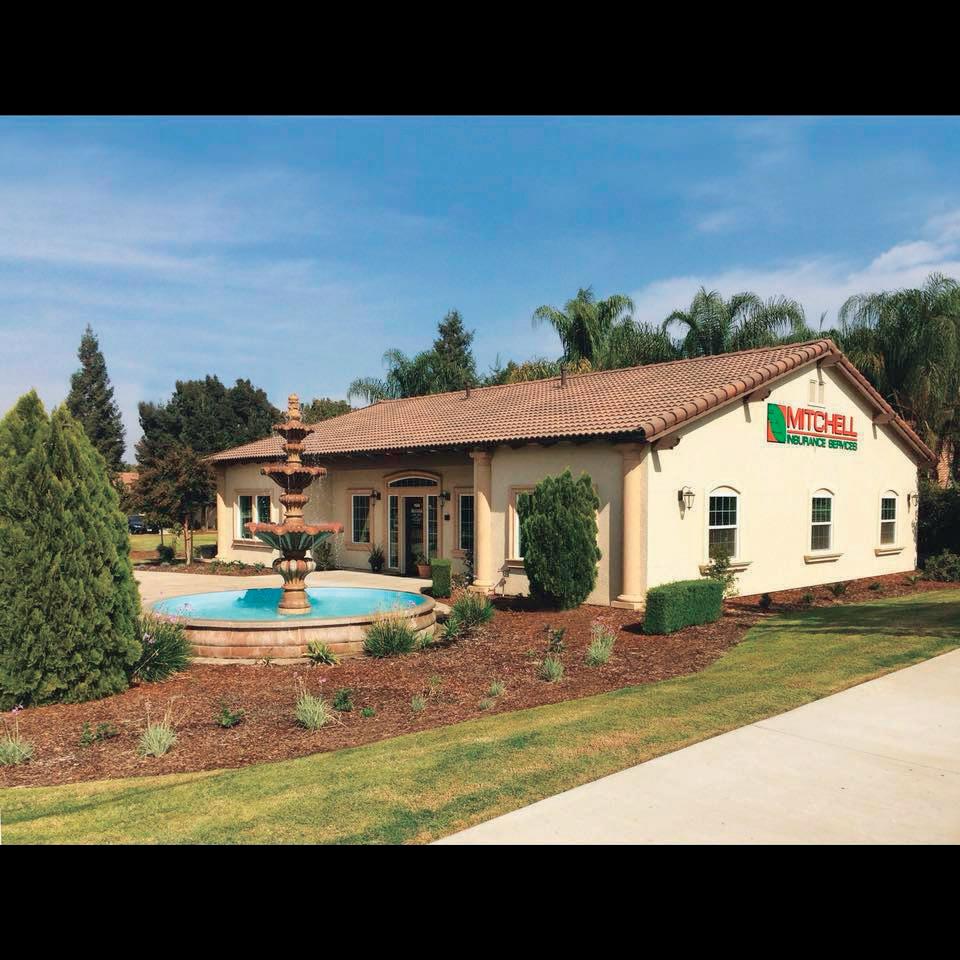



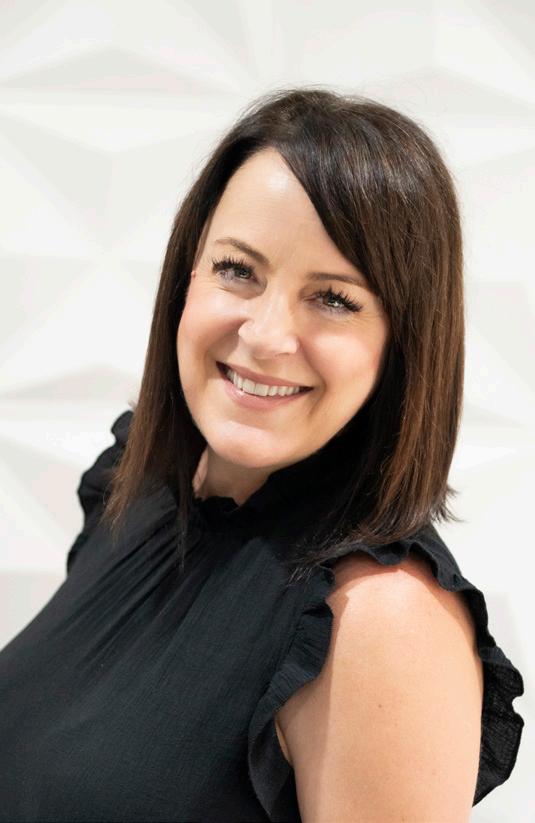


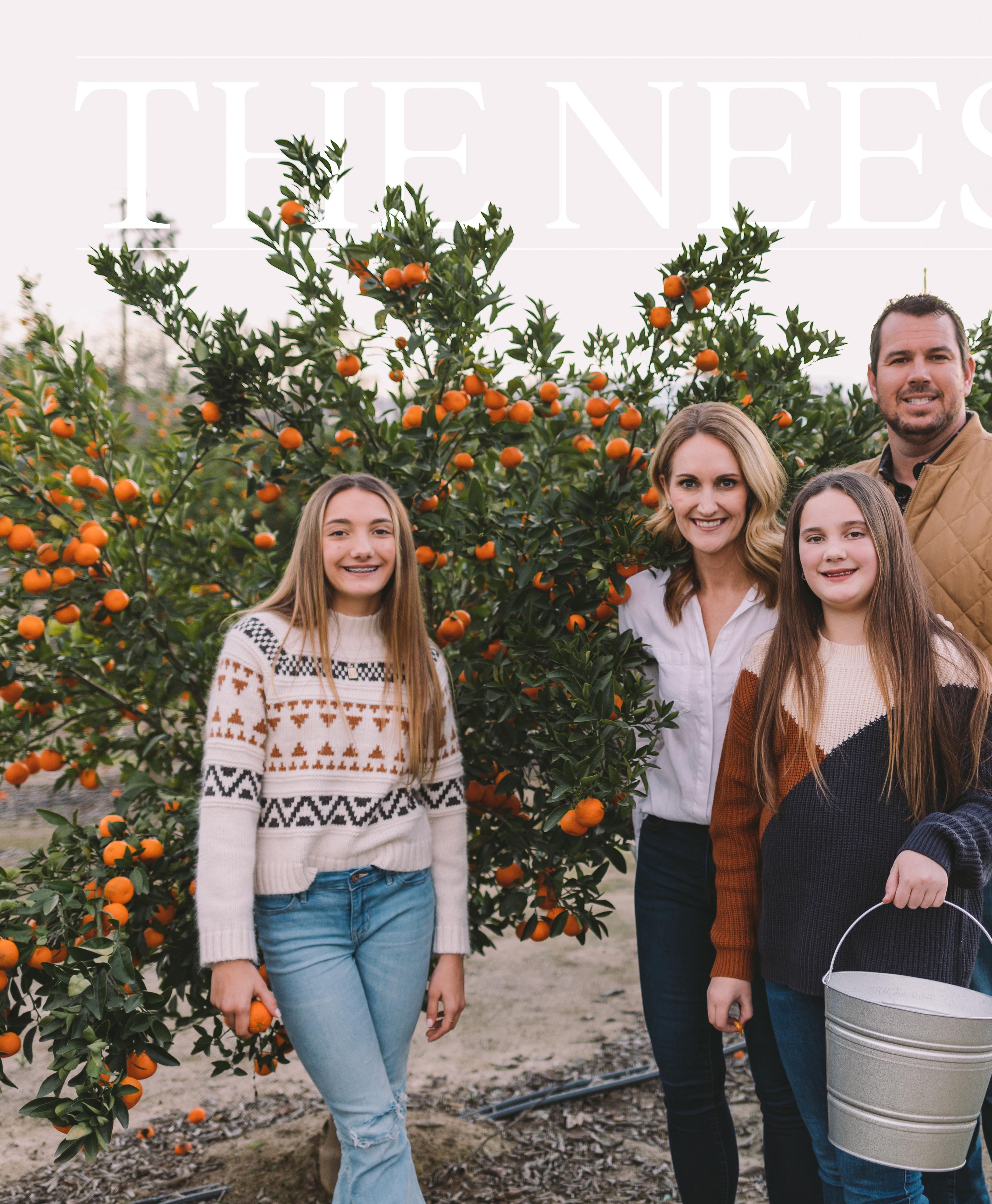
Peekingfrom behind rows of ripe tangelos sits an old farmhouse with stories to tell. Located just outside the southeast corner of town, Leslie and Than Neese put down roots in a piece of the Visalia countryside that holds a lifetime of memories.
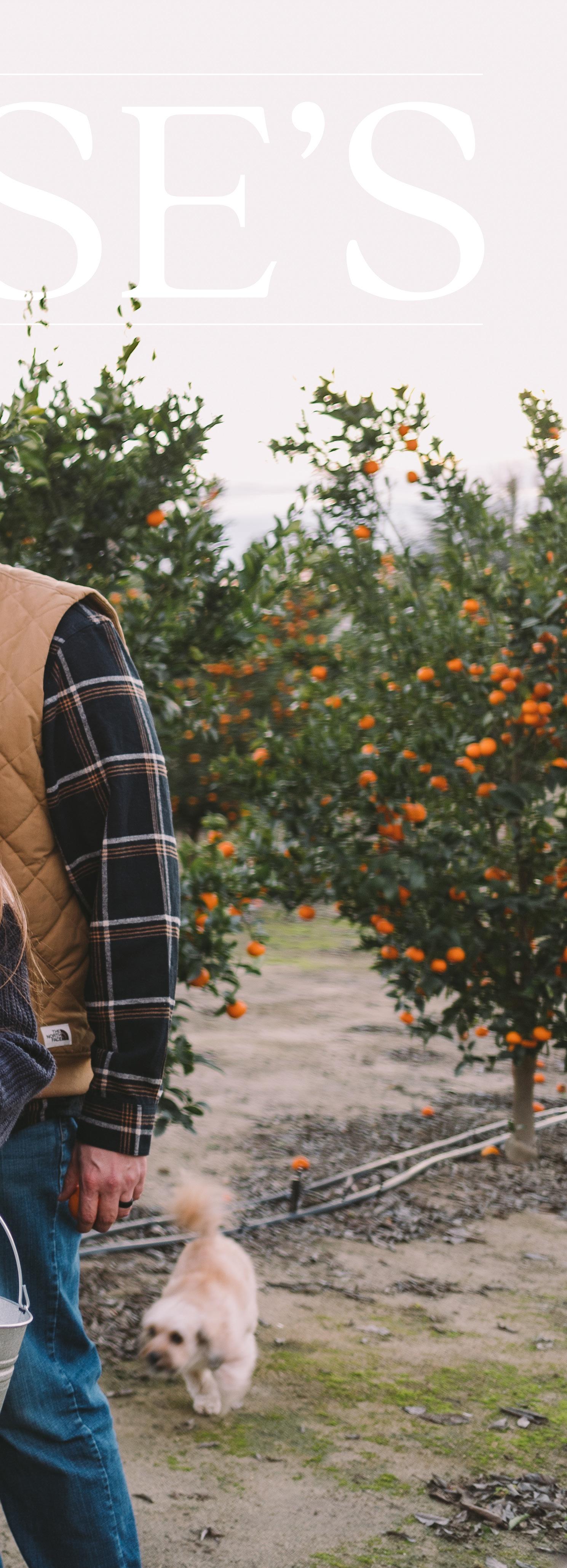
Built in 1880, the two-bedroom farmhouse was located on the corner of Demaree and Caldwell at Griffin Farms. Than’s parents, Dave and Linda Neese, bought the house for $5,000 in the late 1970s and paid to have the home moved to the to a quiet three acres. Dave and Linda poured their sweat and tears into the house, adding a primary bedroom and a Victorian style to the façade. Additionally, Dave hand-milled each corbel as a skilled woodworker, giving a personal touch to the home where he and Linda raised their three boys.
In 2019, Dave and Linda decided to downsize, and Leslie and Than took the opportunity to purchase the home and return to Than’s roots.
Moving into an older home gave Leslie some reservations. “In the back of Than’s mind, he always wanted to buy this property from his parents. It took me some time to come around—it felt like a lot of work. We knew we were going to have to add on, and old homes come with a lack of storage. I saw that this was going to be a big project.” Despite the original hesitancy, Leslie is overjoyed with their home and thankful for the opportunities the house provides.
Leslie came with a vision and a desire to make the space her own, preserving the history while giving the home an update. Working alongside Raudel Macias, a contractor from Lindsay, the addition mimics the style and character of the 1880 farmhouse. The woodwork was milled to match the original moldings and trim. Raudel built a new laundry room,
Words by Natalie Caudle | Photos by Dakota Jacobitwo bedrooms with a jack and jill bathroom, a primary suite with exposed beams, and he converted a former bedroom into a new family room space while opening the wall between the living room and kitchen. The construction added 1,400 square feet to the house and gave the active family more elbow room.

The second generation of Neeses moved into the home while renovations were underway, living in the front of the house while building the expansion. “There were a lot of amazing details already here,” remembers Leslie. “We wanted to build on and refresh the hard work and charm that Dave and Linda had already established.”
The 3,400-square-foot home is perfect for entertaining, with a floor plan design that puts the kitchen at the hub. Leslie envisioned a gathering space where friends and family could

visit as she prepped and cooked. Honed granite countertops contrast the creamy white cabinets and classic subway tile. Nestled near a cozy window seat are an open-shelf coffee bar and a well-organized pantry. Each corner of the kitchen is both charming and functional.
Red oak flooring extends throughout the house, while the front bedroom boasts the original pine floor, lending to the timeless look of the home. Leslie incorporated classic lines and colors honoring the 1880s construction. With a uniquely long shape, the living room is draped in light as sunbeams flood through 19th-century windows framing the antique fireplace. Down the hall, a hexagon penny tile floor transforms the front bathroom into a room from yesteryear.
"Built in 1880, the two-bedroom farmhouse was located on the corner of Demaree and Caldwell at Griffin Farms."

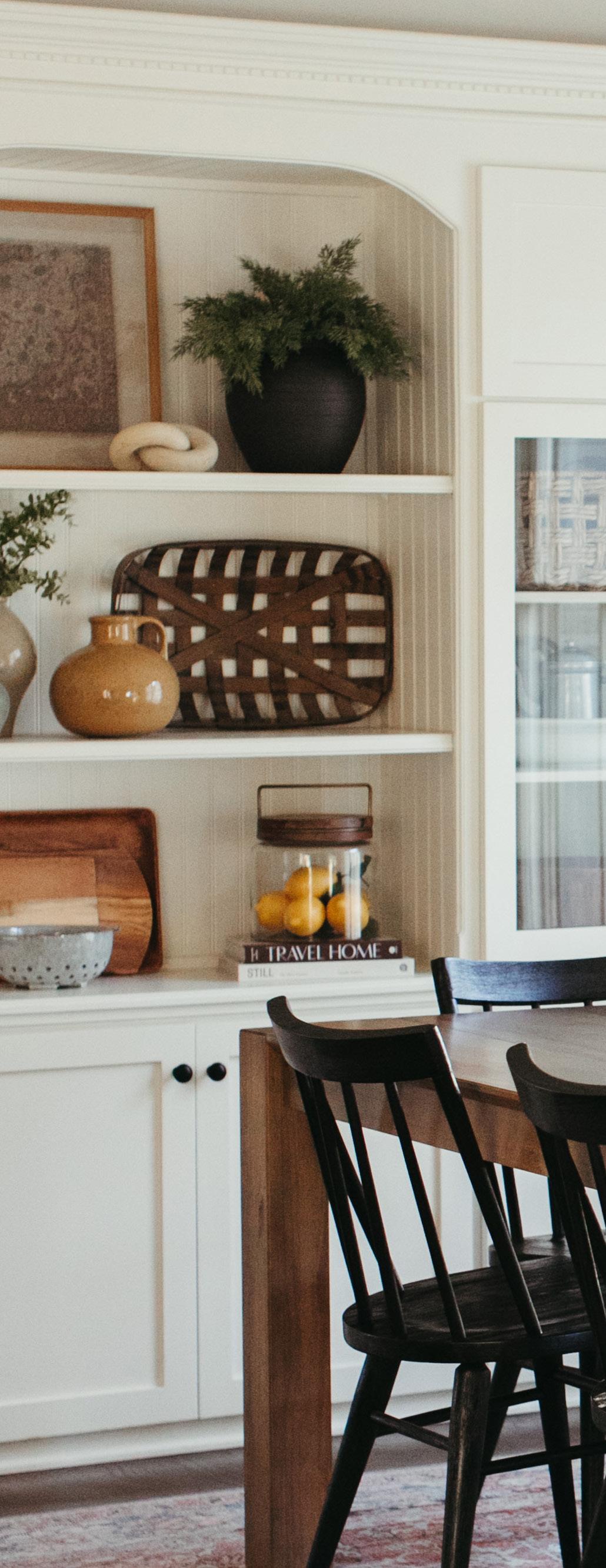
“Hospitality is my love language.”




"Packed within the walls of the old farmhouse is more than a century of history."
Leslie finds design inspiration in the moodiness of Amber Interiors and the modern twist on traditional style that only Joanna Gaines can create. But Leslie, too, has a natural eye for design and understands the functionality and aesthetics of a particular space. “I have always loved home decorating, which led me into real estate and helping people create a vision for their homes; it goes hand in hand.”

Threaded throughout the four-bed, four-bath home is a clean and sophisticated style. Complementary textures of rugs, baskets, throw blankets, and warm leather chairs create a cozy feel within the 14-foot ceilings. “I wanted it to look original but add more function. I wanted the colors to be very tonal and for it all to flow.” Leslie chose classic black hardware and touches of brick flooring, perfectly suited for the historic home, which includes the original glass hardware. Known to her friends for her collection of decorative pillows, Leslie finds ways to accessorize her home through local vendors such as Olives & Home in Visalia and The Avenue in Fresno.
A plaque on the back door is a memento from Leslie’s grandmother and serves as a reminder. “My grandparents had a big heart for hospitality, and I loved that about them. I want this to be a place for others to have parties and host church and school events. Hospitality is my love language.”
Within the three acres of country living are multiple structures, including a large workshop and an office for Leslie’s real estate business. Two generations of Neeses live on the property. Linda lives across the driveway in the cottage, a 1,400-square-foot home with finishes that mimic the main house.
In January 2020, the family faced heartbreak. Leslie recalls, “When Dave passed away, it was made very clear that this is where the Lord wanted us to be. During Covid, we had bonfires every night; it was a huge blessing. The biggest benefit of this property is being able to enjoy it with others.” Than and Leslie appreciate the proximity of family and the opportunities the acreage gives to care for others.
The Neese family runs full speed, serving their community, traveling to soccer tournaments, and thriving at their occupations. But when the days grow longer, the family spends summer evenings grilling, swimming, and hosting friends on their covered patio, finding tranquility in the quiet of country life.
Packed within the walls of the old farmhouse is more than a century of history, and now the Neese family is weaving their own story into the legacy of the heirloom home.

Words by Lifestyle Staff | Photos by Dakota Jacobi
Purging during spring is a common seasonal ritual that signifies new growth and fresh starts. Tackling one project at a time will help you see progress and motivate you to reach the finish line.
A room that is often overlooked for organization inspiration is the dreaded laundry room. This space for that dreaded, never-done chore is a hotspot for clutter, which piles up behind closed doors. However, taking the time to transform it into an organized and functional space will help you be more efficient in the long run.

Have
Here are the tips that Leslie followed to create a tidy look:
1
Gather all of your cabinet items and organize them on your countertop.
Sort your products by type and size.
Make a list of the containers you will need, including sizes and quantities.
Once you purchase your storage containers, use labels to easily find items as needed.

Reload your items into their designated containers.





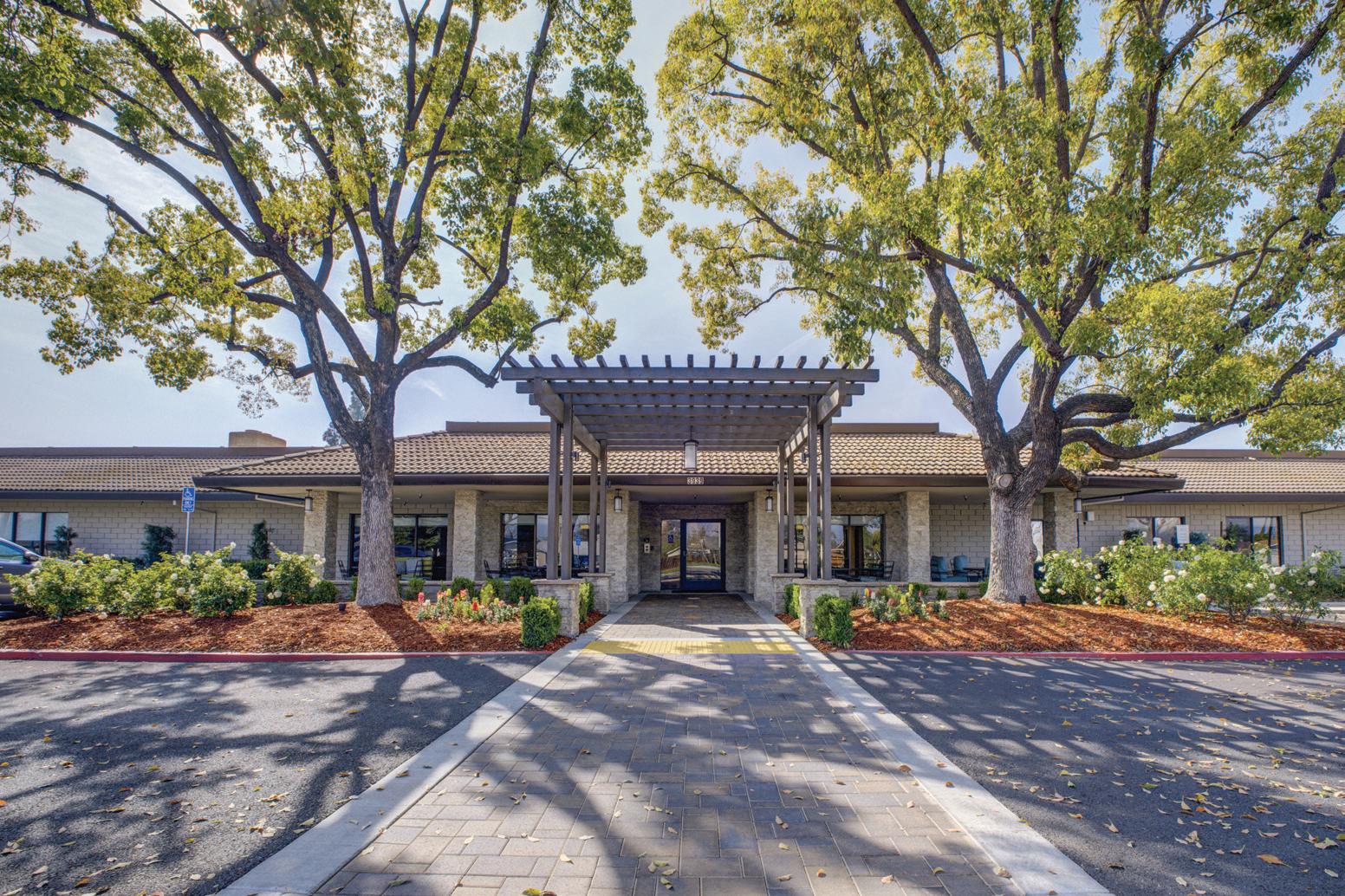

artsconsortium.org
Eachyear, the Arts Consortium organizes a self-guided tour through artists’ studios located south of Highway 198. During the tour, participants are introduced to the art spaces of both nationally recognized and emerging Valley artists. The tour provides an opportunity for the public to learn more about the talented art professionals working behind the scenes in our area. The artists produce a broad range of artwork, from paintings and woodwork to resin casters and jewelry. One may even find the perfect piece of art to take home!
The South Valley Art Tour (formerly The South Valley Artist’s Studio Tour) was previously a full-county biennial event. It has always operated as a self-guided tour (with the use of a “Passport” map-book), but was originally only for artist studios. It is currently still a 2-day self-guided tour, but is now divided in two parts, alternating between the North and South ends of the county each year. Artists are still encouraged to group together and share space to allow an

artist or arts organization to participate in every year’s tour, if they so choose. The event has developed with little to no financial support and, in the past, required participants to purchase a ticket to join the tour. This year, due to the aid of Covid recovery funds, the Arts Consortium is excited to announce the event is free of charge for the community. However, only 500 tickets are available for reservation.
The Arts Consortium was founded in 1996 and became a non-profit arts council for Tulare County in 2009. They are one of the State-Local Partners of the California Arts Council. The organization also works closely with other nonprofits, local governments, and businesses to provide opportunities to create and celebrate the arts for all residents and visitors.
They have partnerships with the City of Visalia, CASA of Tulare County, and the Mental Health Branch of Tulare County’s Health and Human Services to operate and develop regular programming.
Words by Lifestyle Staff | Photos provided by Arts ConsortiumThe Arts Consortium brings together artists, organizations and art enthusiasts to advocate, promote and provide opportunities to create and celebrate the arts for all Tulare County residents and visitors. Through leadership and innovation, we are committed to preserving our cultural and creative diversity by building community where the arts are a vital part of everyday life.
South Valley Art Tour, Taste the Arts Festival, First Friday Art Hop with Arts Visalia, Farmer's Market Live Arts, and more!


99
16 artists
5 cities
12 stops
For more information, please contact Ampelio Mejia Perez at 559-772-0001.
65
2023 10am-5pm
March 25-26
Sponsored Content
These places recently made their big debuts, visit their new spots!

271 E. Pine St., Exeter
Wed-Thurs 10am-4pm Friday 12pm-6pm Saturday 10am-3pm justdoughwithitcookies.com
Specializing in extra large and extra delicious cookies that have names as unique as their flavors! Located in Downtown Exeter.


justdoughwithit_
1515 Smith St., Kingsburg
Tues-Sat 11am-9pm roadhousekingsburg.com
559-897-5433
Friendly service, flavorful food, and cocktails made using the freshest ingredients. A great date night spot in Kingsburg!
109 S. Church St., Visalia
Tues-Fri 10am-3pm sweetmemoriesfloral.com
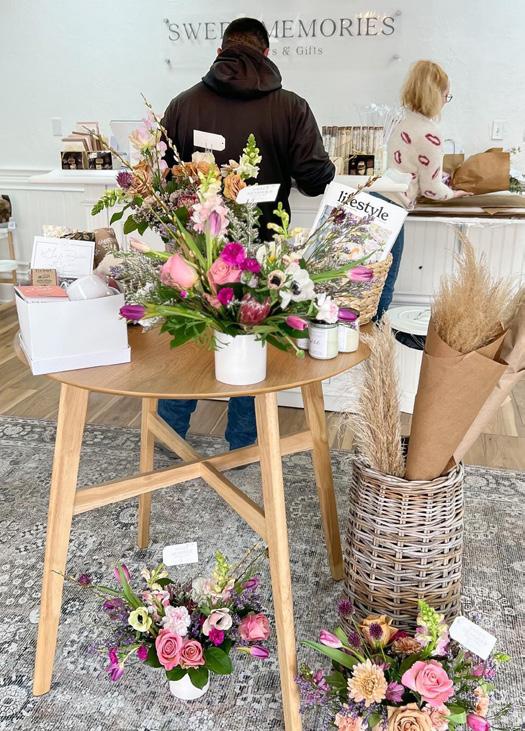
559-625-5242
Providing flowers and gifts that fill your heart with joy and make you smile. Visit their lovely gift shop in Downtown Visalia.
sweetmemoriesflowers
4303 W. Noble Ave., Visalia
Tues-Sat 12pm-7pm bigpapaswoodfiredpizza.square.site

559-713-6294
Not only are their sourdough pizzas a local favorite, but their grilled sandwiches and pastas are one of their best kept secrets!
bigpapaswoodfiredpizza
116 S. Locust St., Visalia
Tues-Fri 8am-7pm
Saturday 12pm-7pm Sunday 12pm-5pm queconcha.com
559-736-0337
They are passionate about creating community and their conchas, churros, and iced coffees are delicious!
roadhousekingsburg
queconcha
hat comes to mind (other than Amsterdam) when you think of Holland? This past summer I traveled with my sisters, Opa, and Oma* to our family’s home, and was able to experience my heritage and the place they had emigrated from; Oma arrived in the U.S. in 1949, and Opa came in 1972. We spent our days biking to surrounding towns and lesser-known villages. When biking wasn’t an option, we opted for the tram, which got us from one point to the next in little to no time. Of course, we made a day out of visiting Amsterdam, but read on to find some hidden gems if you’d like to experience more out of your trip through the Netherlands.
by Jonna Dodge

Words and photos

No trip through Holland is complete without talking about cheese. Here in Alkmaar you can visit the cheese market, where they demonstrate the old-fashioned way traders would weigh and sell cheese. Make sure to plan your trip with this experience in mind. It happens every Friday during select summer months. Vendors line the canal offering traditional dutch foods like poffertjes (mini puffed pancakes); they’re worth every calorie.


This small city in southern Holland is known for its unique blue and white pottery which is hand painted—a practice dating back to the 17th century. It’s an old city which gained popularity as a port for the Dutch East India Company and was the home for various artists, like painter Johannes Vermeer. While we were there, we visited the city hall and saw two massive churches—the Oude Kerk (old church) and the Nieuwe Kerk (new church) which holds the Dutch royal family’s burial vault. Have good walking shoes and take the stairs to the top of the tower to see an amazing view of the city. My sisters and I walked along city canals to the Royal Delft Experience where we took a guided tour through the last remaining Delft factory and saw a master painter at work.

Marken is another charming fishing village that was separated from the mainland in the 13th century by a storm. The best way to travel around is by foot. We took a long walk through the countryside to the lighthouse and saw homes built on stilts for protection from the water. Rounding out our day trip, we had lunch on the island, eating fresh fish, which was really all they had on the menu.
Spotted a herd of holsteins in the countryside of Marken

Dressed up like the "locals" in Volendam
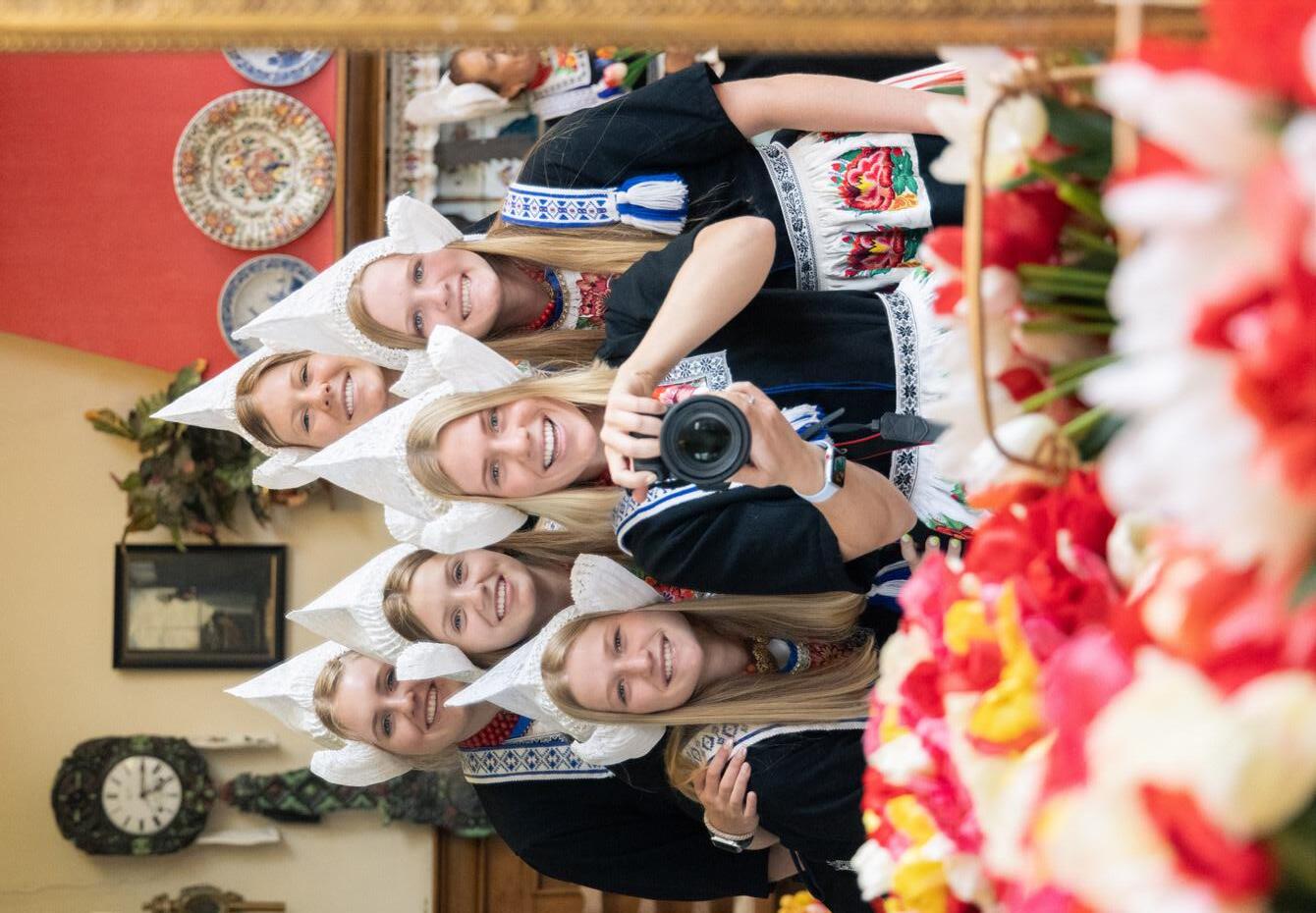
This vibrant fishing village is located in North Holland. While there, we walked along the dam and took photos wearing traditional dutch clothing. From this waterside town, we took a 30-minute boat ride to Marken, a peninsula-turned-island.
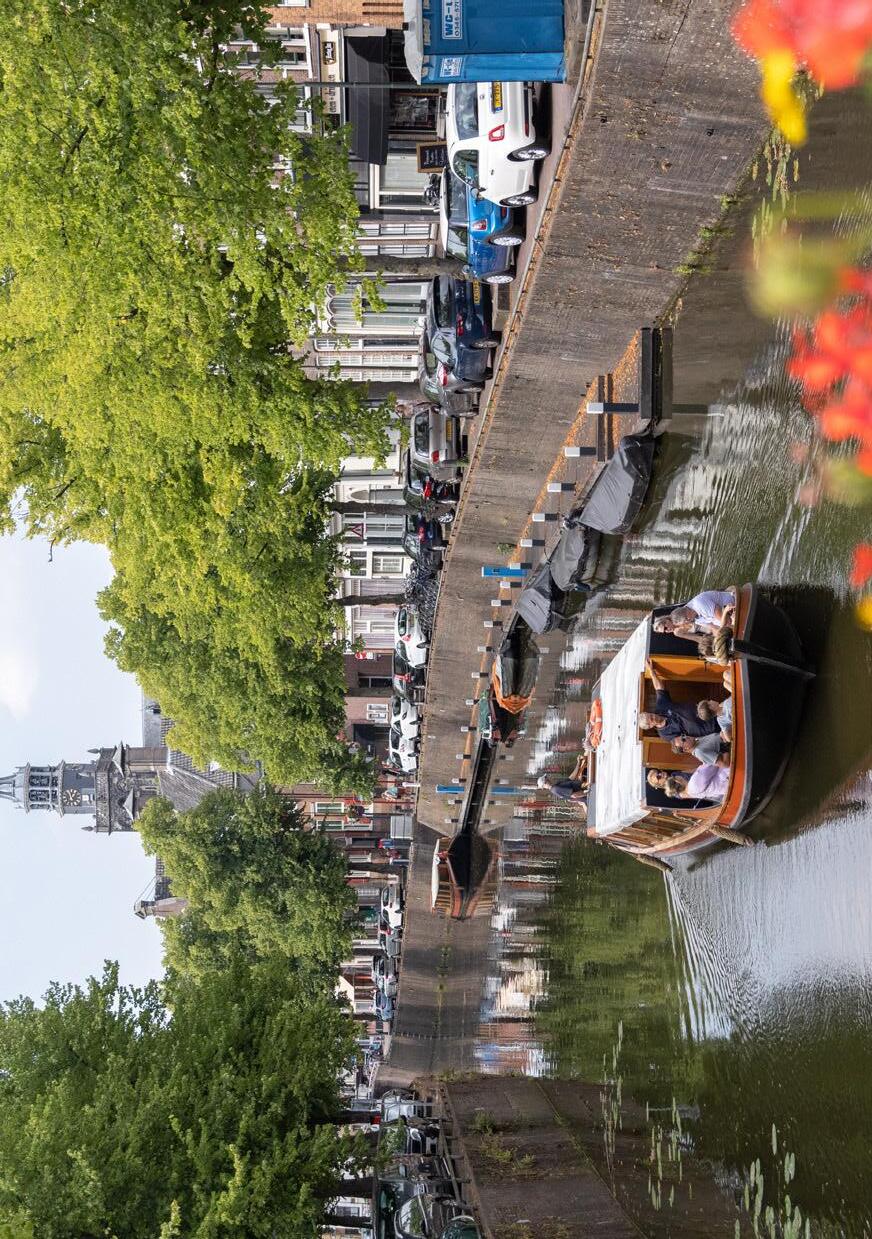

This is one of those towns we came across by accident. We went for dinner in an old defense tower called Hoofdtoren, a late-Gothic structure, used to protect the port during the 16th century. You go up a spiral staircase to the second floor where there’s a quaint little dining room. The food served was



This is another small town with some interesting callouts in history. Haarlem was known for having a massive beer brewing industry in the 17th century and also being the epicenter for the tulip mania: when exotic tulip varieties and bulbs were sold for exorbitant prices. This is also the hometown of Corrie Ten Boom, author of The Hiding Place, an autobiography about her family hiding Jews in their home during the Holocaust. Her original home is now a museum, but it’s key to book tickets months in advance. The countryside between Leiden and Haarlem is covered in an array of color from tulip fields during springtime. We recommend taking a bike ride for the best experience.
A no name little village where my Opa was born. Here we visited the family farm and market called Lindenhoff, which sources organic meats, produce, and cheeses from growers across the nation and ships them to homes. You can stop by for a fresh cup of coffee and sweet bakery treat at their cafe.
My sister Emma with the box of fresh cherries that we purchased from the Lindenhoff market.
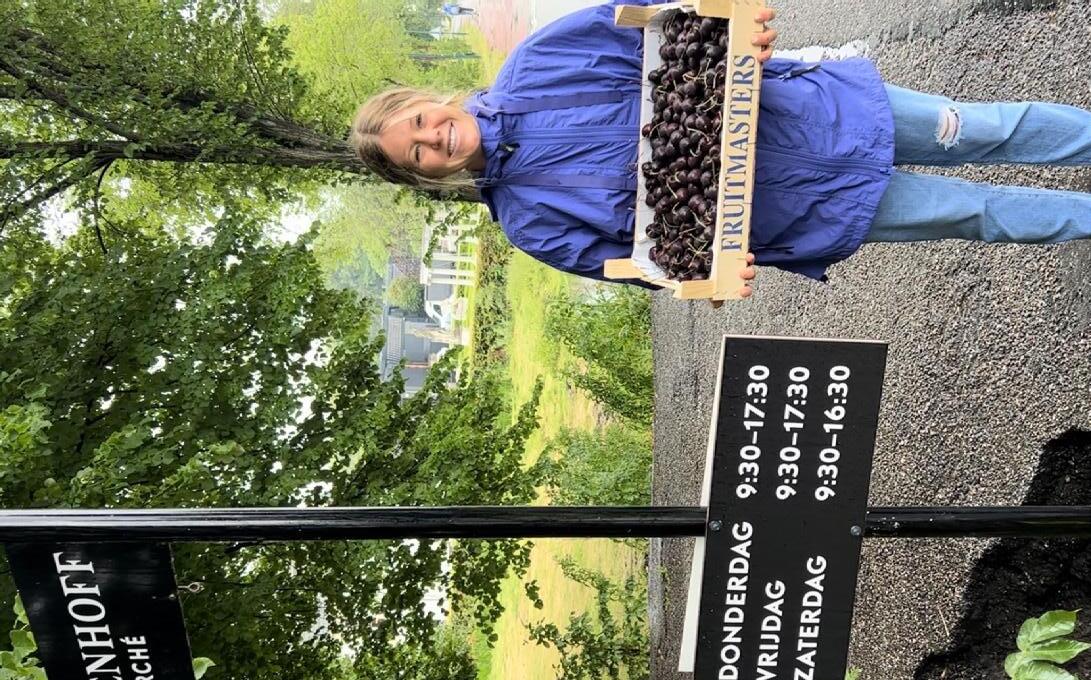
We took a whole day to ride through the canals of South Holland starting in Alphen aan den Rijn and ending at the seaside city of Katwijk. Packing lunch for a picnic on the boat, we saw the Dutch countryside in a new light. Boating with a local allowed for a personalized tour filled with rich history and authentic sights. We saw countless windmills and pastures with cows, and topped the day off with gelato on the beach.
Bike riding along a canal in Gouda



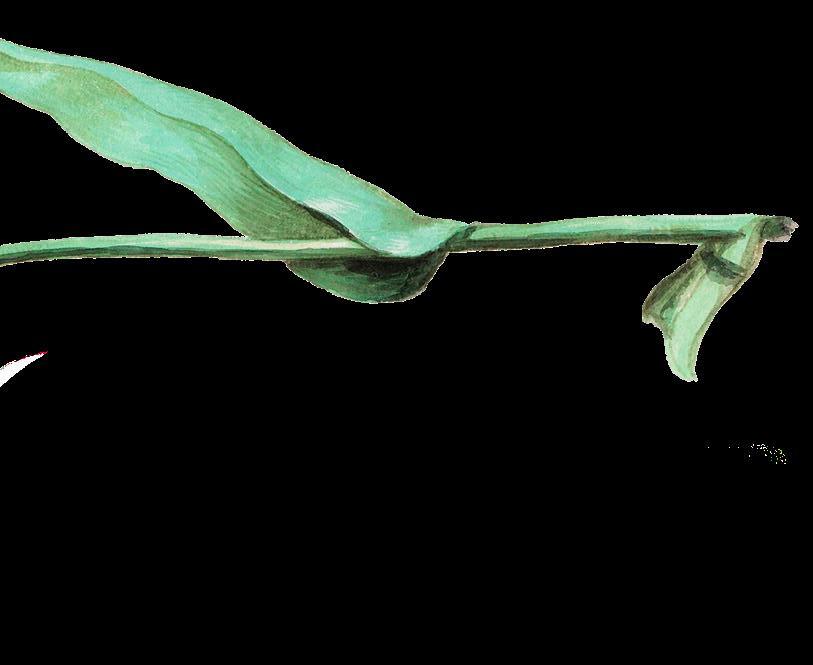
Windmill sighting on our boat tour on the Rijn
Gouda sounds like what it is, a city filled with cheese. Similar to Delft, this city has a historical town hall worth visiting, with bustling store fronts and markets on select days of the week. You’ll find a whole new world of options when it comes to Gouda cheese combos. We took a day trip here and visited the Kamphuisen Syrup Waffle experience. Pro tip: You can purchase a combo ticket which gets you access to this factory tour and the Gouda Cheese Experience for a better price.
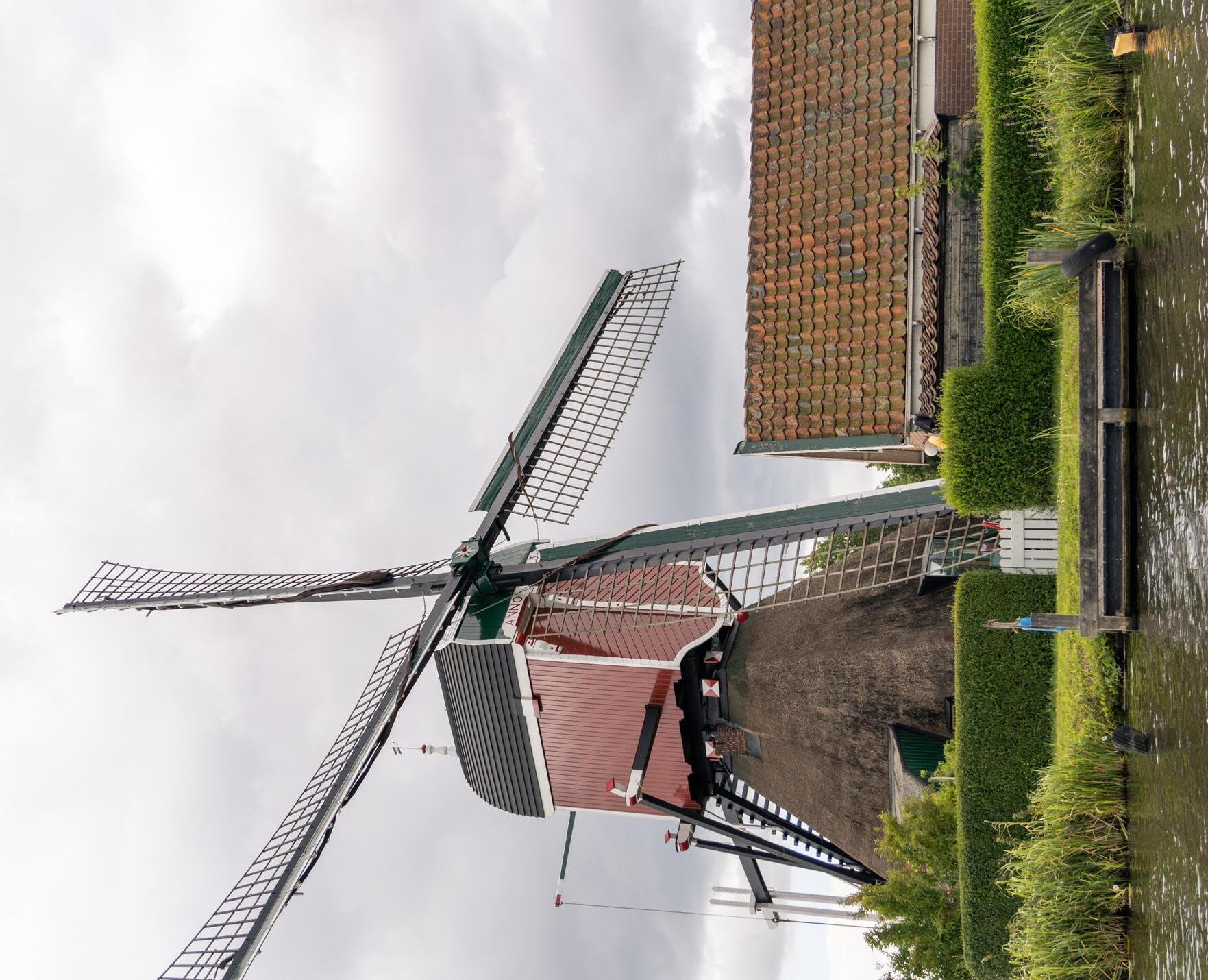

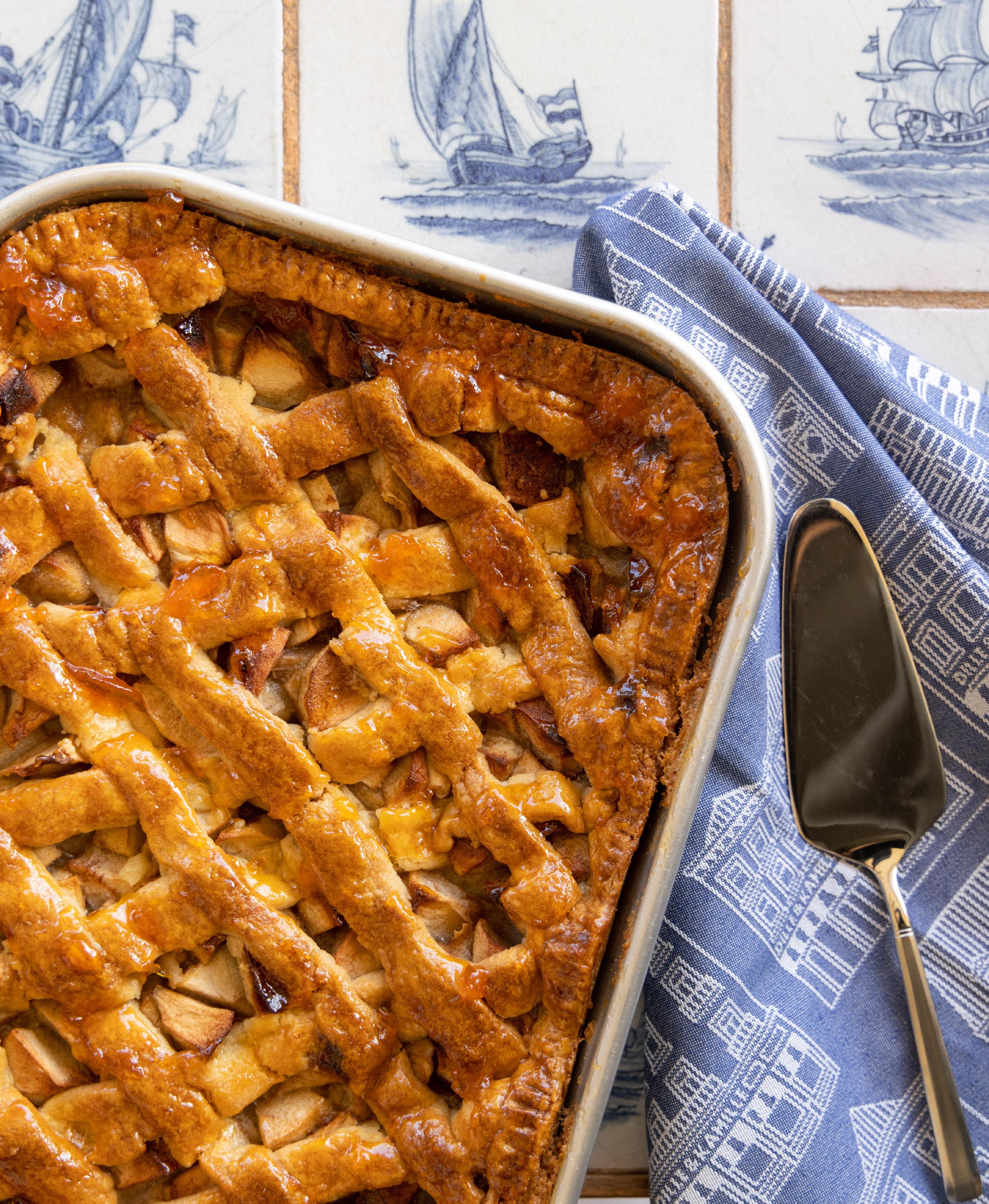
8-10 Granny Smith apples, peeled and cubed
2 teaspoons cinnamon
⅓ cup sugar
Lemon juice
3 cubes butter
1½ cups sugar
3 cups flour, plus more for rolling out crust
3 tablespoons apricot jam
Whipping cream for topping
1. Preheat your oven to 375F.
2. Prep your filling: peel and cut apples into small ½-inch cubes. Mix in a bowl with cinnamon, sugar, and lemon. Set aside.
3. Mix butter, sugar, and flour by hand until the dough is well combined. Continue mixing until it feels wet to the touch.
4. Set aside ⅓ of the dough, then take the remaining amount and flatten it to the bottom and sides of a 9x13-inch pan.
5. Add 3 tablespoons of dough to the bottom of the flattened crust, to help soak up additional juices from the apples, preventing a soggy tart.
6. Pour the apple mixture into the pan.
7. Take the reserved dough and flatten it on a floured surface. Cut the dough into long ½-inch pieces and place on top of the apples in a grid-like pattern. Take the extra pieces and line the perimeter of the pan to finish off the crust.
8. Brush whipping cream liberally on the tart crust.
9. Bake the tart for approximately 1.5 hours, or until a dark golden brown.
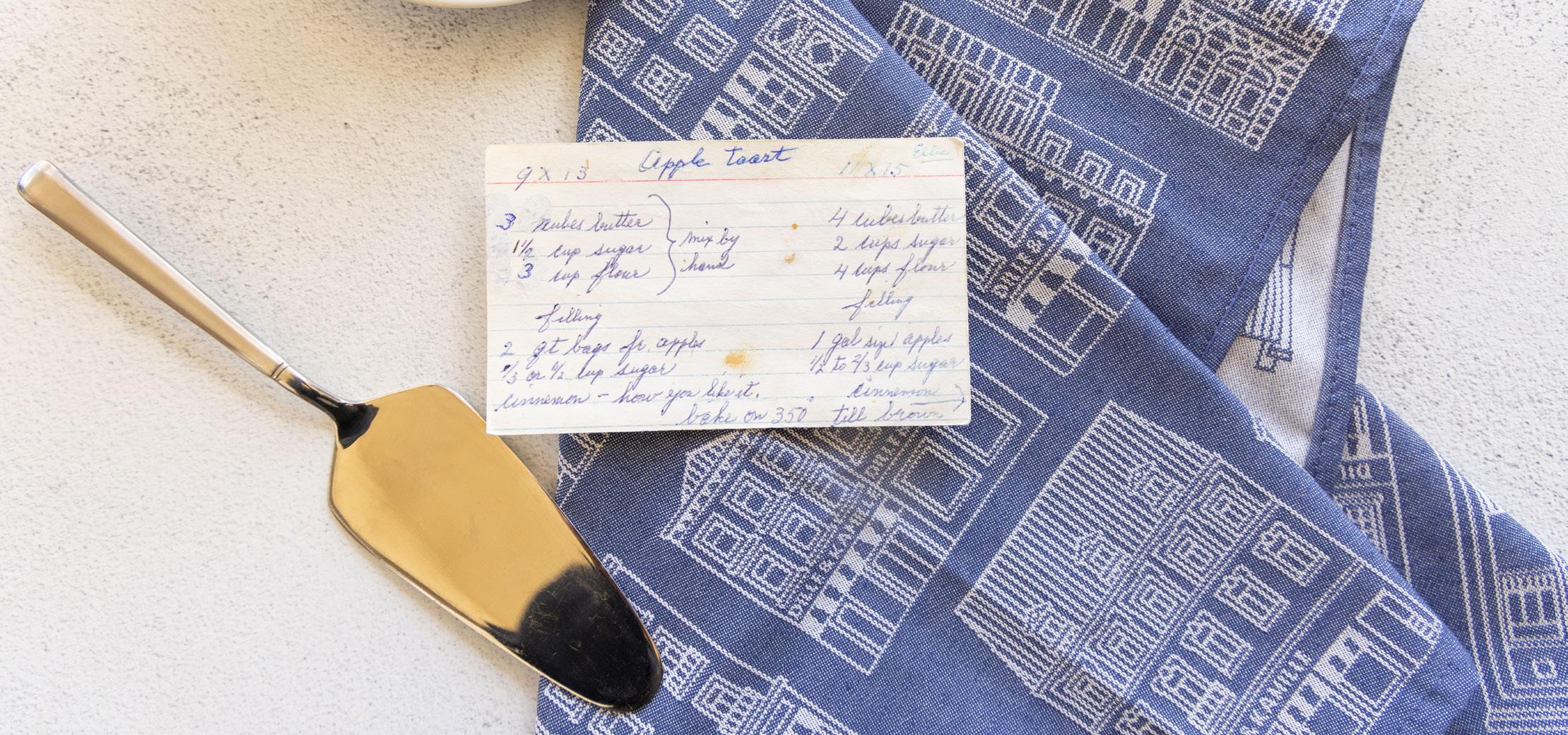
10. Using the stove or microwave, heat the apricot jam until boiling. Brush on the golden crust for the perfect shine.
11. Allow the tart to cool before serving. Plate with a dollop of freshly whipped cream and serve with a cup of coffee.
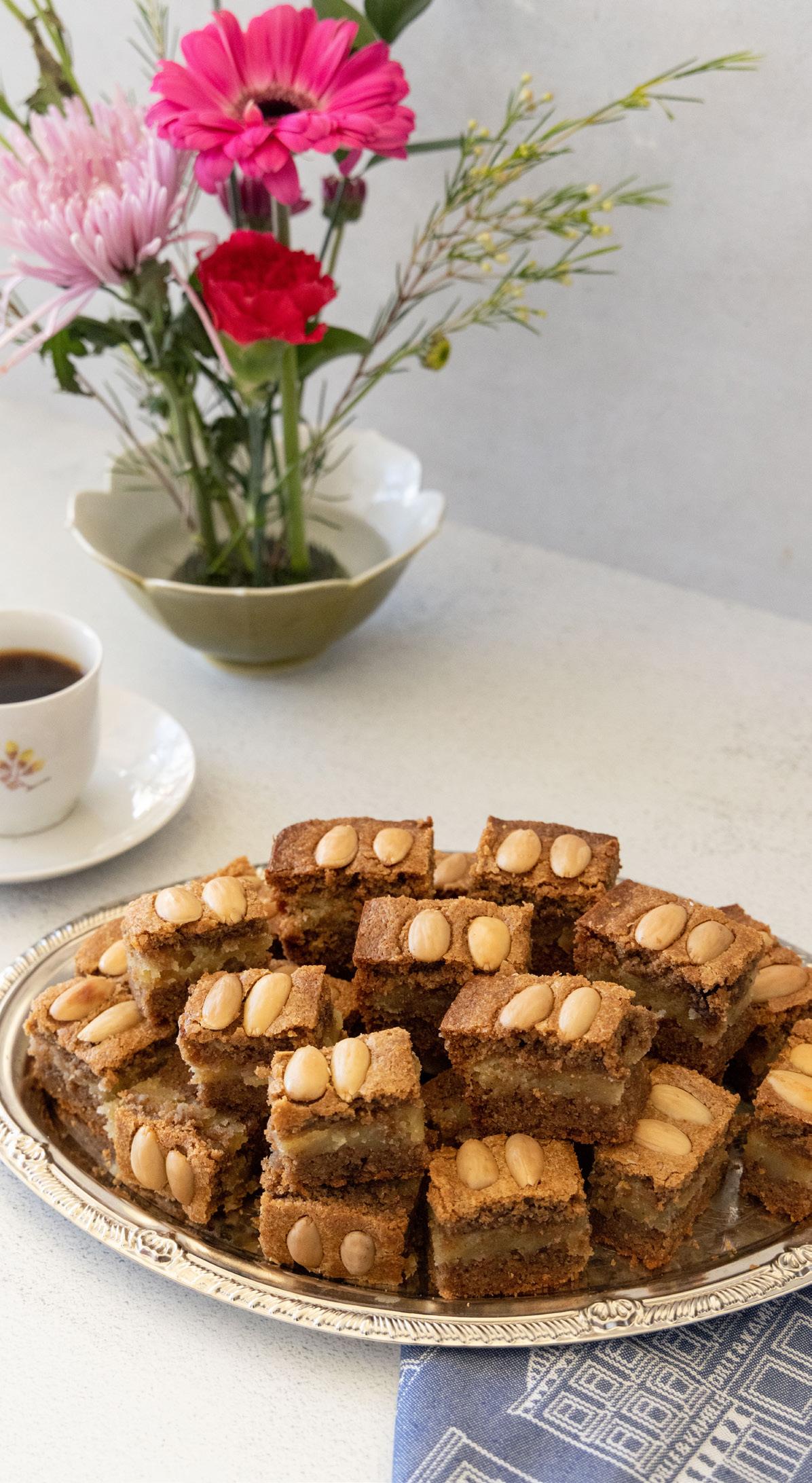
(Almond paste-filled Dutch spice bars)
Dough:
3 cubes butter
1 cup brown sugar
1 cup white sugar
2 eggs
3 cups flour
1 teaspoon baking soda
½ teaspoon nutmeg, heaping
2 teaspoons cinnamon, heaping
1 teaspoon cloves, heaping
1 cup almonds, boiled to remove skins, and halved
Filling:
2 eggs, beaten
½ cup sugar
1 teaspoon lemon extract
1½ cups pure almond paste
1. Combine all filling ingredients and beat until well combined. Place in the refrigerator to cool while making the dough.
2. Mix the butter, sugars, and eggs until well combined.
3. Add dry ingredients (all remaining dough ingredients except almonds) and mix some more.
4. Divide the dough in half and place one part at the bottom of a 9x13-inch pan (only the bottom, not the sides). Preheat oven to 350F
5. Spread the filling on top.
6. Flatten the second half of the dough on top, being careful not to combine with the filling layer.
7. Place the almond halves on top in a pattern that follows your cut lines.
8. Bake at 350F for 40 minutes or until golden brown.
9. Allow the bars to cool for 20 minutes before cutting.
Ellie, age 11, arrived in New York with her family, then flew to California. In America, they began by operating a cash and carry delivery service for dairies, which is still operating today.

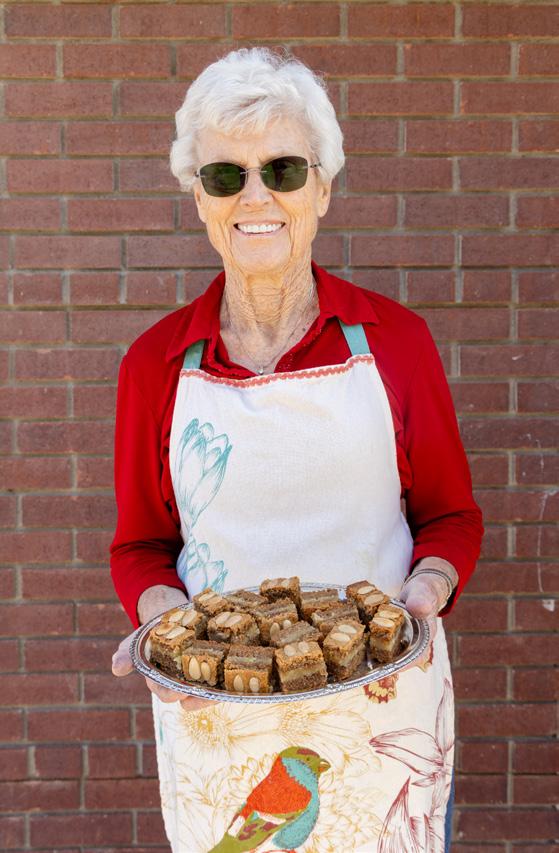
Fornearly three-quarters of a century, the Sweet family name had been synonymous with selling quality merchandise at a fair price—and lots of it. Even though their “big store” was in Visalia, their business trade area reached far beyond the Tulare County seat. Products were sold and delivered as far south as Tehachapi and Fort Tejon, as far east as Independence in the Owens Valley, and up to Millerton in the north. Sometimes it took oxen-drawn delivery wagons several weeks to make the round trip. As a result, the well-run, well-respected mercantile company earned an enviable reputation, and the Sweet company name became known throughout the San Joaquin Valley and beyond.
The success of the company had much to do with its founder, Solomon Sweet. Born in Germany in 1827, the 18-year-old sailed to America, landing in New York City in 1845. After short stays in Chicago and Milwaukee, the energetic young man with a strong work ethic was lured to California. He arrived on the side-wheel steamer “Georgia” in San Francisco in 1851, then made his way to Stockton, where he worked as a store clerk. Next, he mined for gold for a time in California’s Mother Lode. In 1854, he opened a general merchandise store in the Mariposa County gold camp of “Agua Fria.” While living there, on at least one occasion, Sweet rode horseback south into Tulare County. He camped at what is now named Cross
Creek, near present-day Traver. He recalled one morning waking up and seeing “thousands of antelope and deer on the green meadows around him.” He rode into nearby Visalia, which was surrounded by a huge forest of Valley Oak trees. To him, the town looked like “paradise.” He vowed to eventually return and make it his home.
In 1857, his dream came true. Sweet moved to Visalia, bought out Nathan Baker’s general store and partnered with James L. Wells to form the Wells & Sweet store. Other partnerships would follow, but eventually he became the sole proprietor.
In 1860, Sweet married Annie E. Phillips of San Francisco. After their ceremony in the bay city, the couple made the three-day stagecoach trip to Visalia to establish their home. Much credit is given to Annie for the growth and success of the business and also for being a “worthy helpmate” to her husband. The couple had nine children.
Solomon Sweet was known for more than his ability to sell merchandise in a general store. He became a financial and business advisor to many. His knowledge of crops, cattle, land values, and business conditions made him a valuable resource to the community.
By the 1880s, the Sweet company had established itself as a business leader in the Valley, which attracted his friends and family, who joined him in Visalia. After the disastrous 1886 Tulare fire in which 77
Looking east on Main Street. January 1932. Building shown here in a modified version still stands today. Note: Visalia had just received a light dusting of snow.[Courtesy of the Shiffert Family]

Employees inside the S. Sweet office.

business buildings were destroyed, the Sweet company delivered over 200,000 feet of lumber to help with the rebuilding. By 1892, S. Sweet & Company incorporated under the name S. Sweet Company. Solomon Sweet, sometimes called the “grand old man” took charge of the company headquarters in San Francisco and turned over the operations of the Visalia store to his close friends and relatives led by Adolph and Leon Levis. When Solomon Sweet died in 1905, his son Adolph D. Sweet, known as “Ad” took over the business.
The store was clearly a dominant enterprise in Visalia, especially in the early years of the 20th century. Employing over 50 workers, the company had dry goods, millinery, tailoring, shoe, hardware, implement, grocery, furniture, and grain departments. In addition to the store on Main Street, the company had several warehouses throughout town.
The “big store” was a two-story brick building occupying a large space on the south side of Main Street between Court and Church streets. It even had an elevator complete with an operator. The Sweet store held regular anniversary parties and sales events with the biggest being the 68th birthday bash in 1925. The highlight was a
special eight-page Visalia Times-Delta newspaper supplement that included Sweet history and advertised merchandise for sale.
As the company entered the decade of the 1930s, ugly signs of the Great Depression began to appear. The Friday edition of the October 30, 1931, Visalia Times-Delta newspaper stunned Visalia and much of the San Joaquin Valley when the company announced it was closing its doors. They wrote, “This store after 74 years of honest and faithful service to the people of the San Joaquin Valley quits!!!” With the shocking news, the company announced a huge merchandise sale. In later issues of the newspaper more hints about the closing would surface. On Tuesday, December 1, the Sweet company wrote in the newspaper, “For over 70 years your neighbor and friend—a business born in honor, cradled in righteousness and matured to majestic grandeur, only to fall in a world crisis when demand for quality merchandise gave way to bargain clamor and quality mediocrity…S. Sweet quality cannot be lowered, regardless of price slaughter, which is now going on.” The Sweet dynasty had succumbed to hard times, and after 74 years of business, they signed off simply saying “The End.”









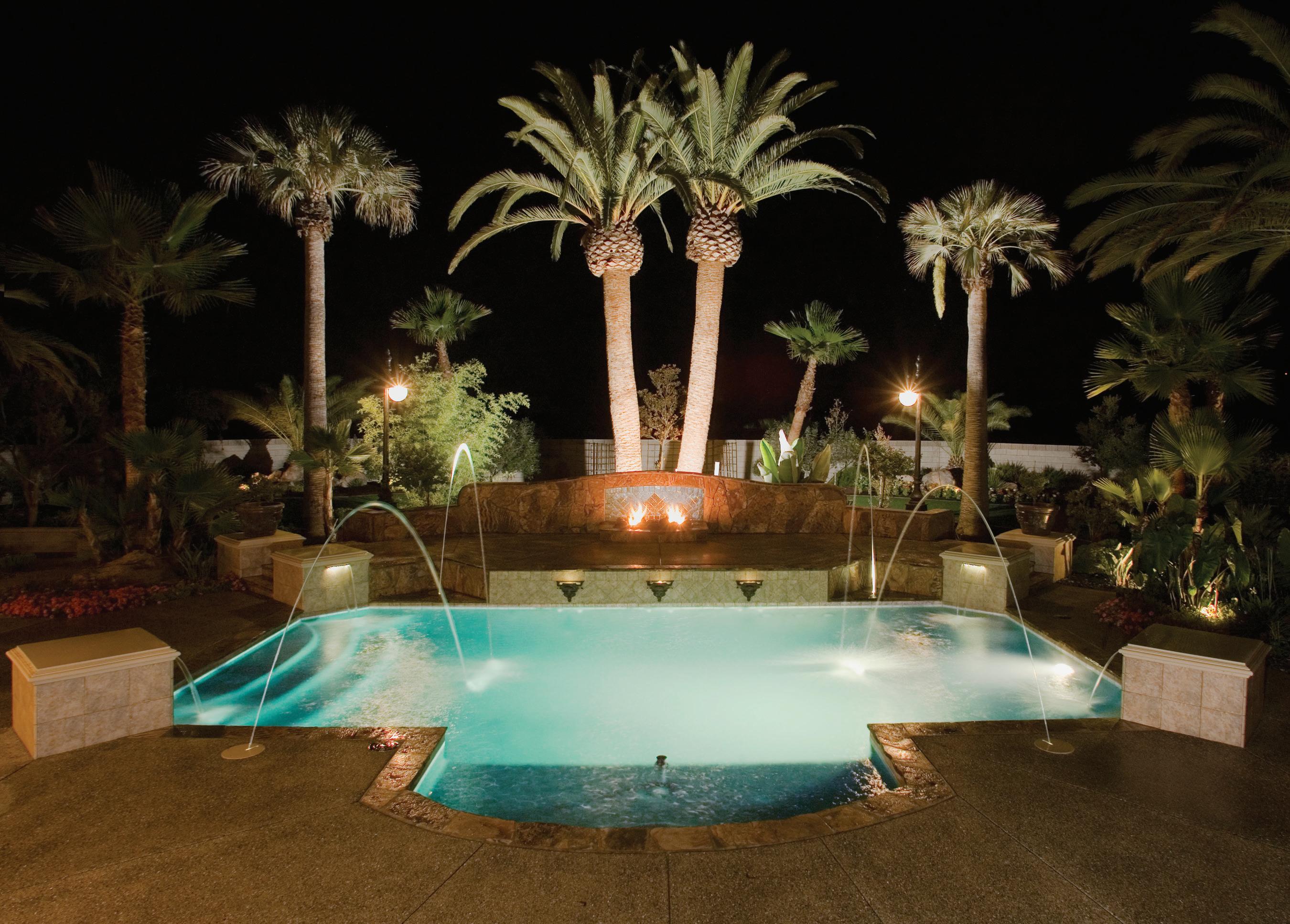



As we begin this new year, we want to continue learning and growing to better serve our communities. That's where you come in. We want to hear from you about what you enjoy, want more of, and would like to see changed.
Your opinion will help us shape future content and continue to celebrate what makes the South Valley an amazing place to live. Follow the QR Code to fill out this 2-minute survey.
Thousand Twenty Three









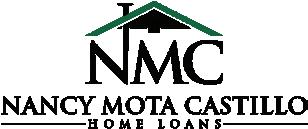
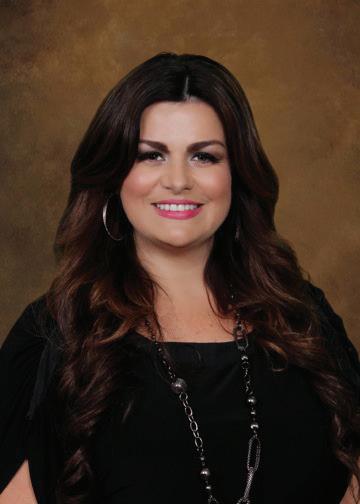
When: March 4 & 5
Where: Tulare County Fairgrounds
Hosted by: Rusty Roots Show, rustyrootshow.com


When: March 11, 8am-1pm
Where: Exeter Union High School
Hosted by: Rocky Hill Triathlon, runsignup.com
When: March 17, 4pm-7pm
Where: 324 S. Sante Fe St., Visalia
Hosted by: Topograph & Lifestyle Magazine, visalialifestyle.com/best-of-2023/


When: March 11, 1pm-5pm
Where: Visalia Recreation Park
Hosted by: Visalia Breakfast Lions, visaliabreakfastlions.org
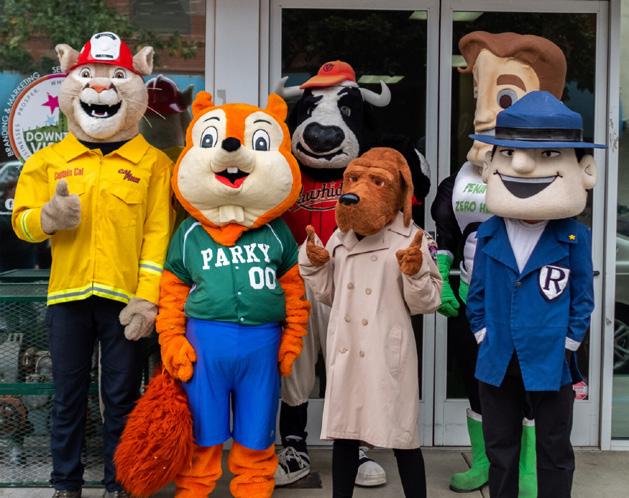
When: March 18, 11am-1:30pm
Where: Downtown Visalia
Hosted by: Downtown Visalians, downtownvisalia.com

When: March 25, 10am-3pm
Where: 1852 Visalia
Hosted by: 1852 Visalia, Sugar’s Succulents, Downtown Visalians 1852visalia.com
Celebrate the citrus season with a new beer release, vendor booths, and more!




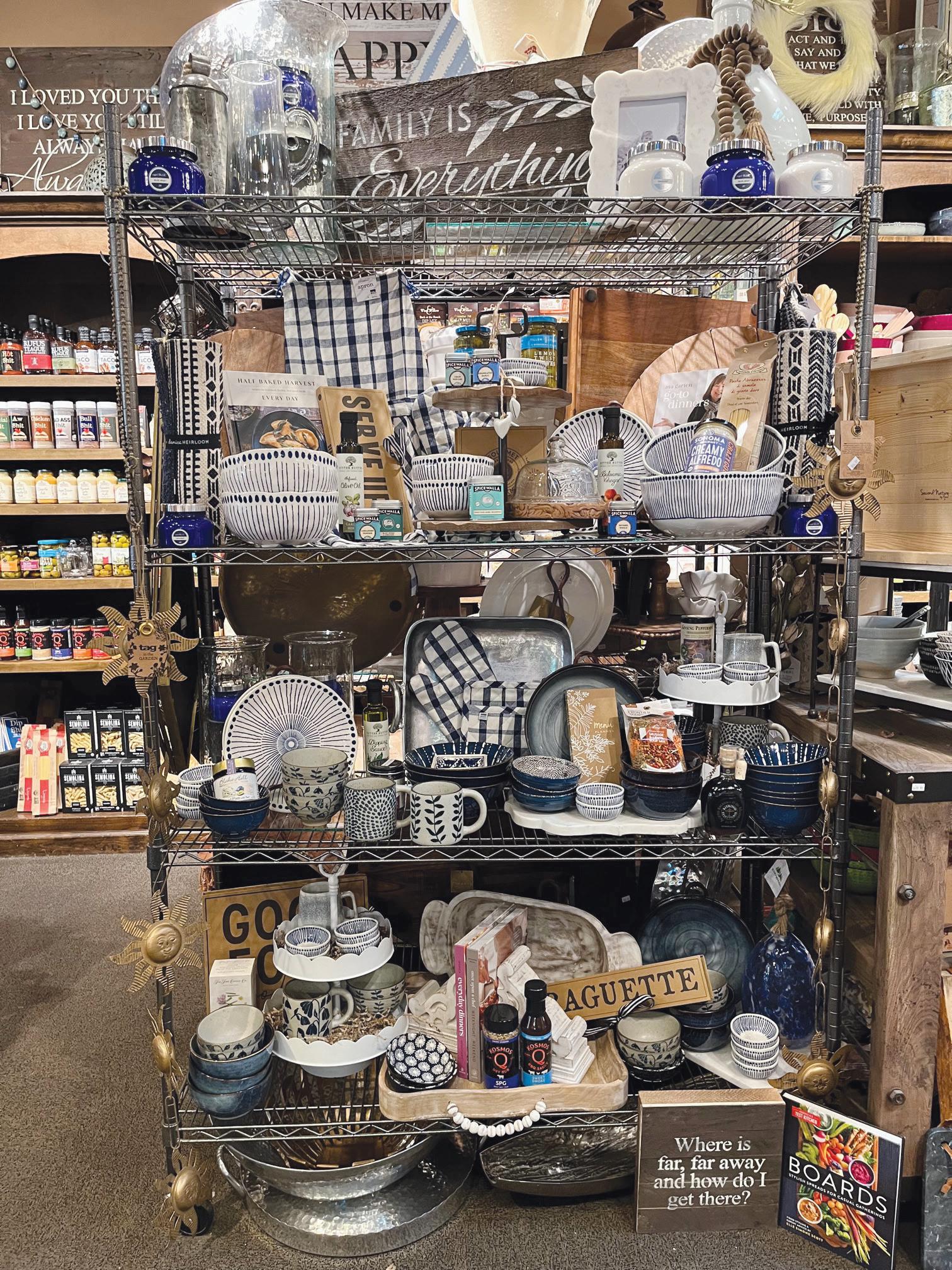
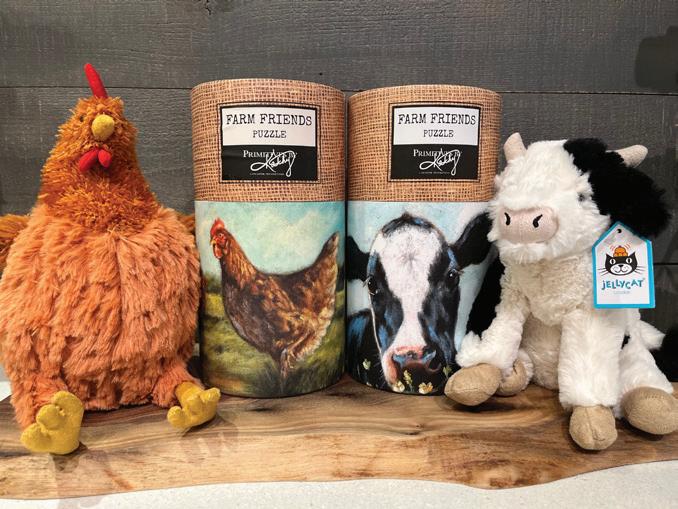

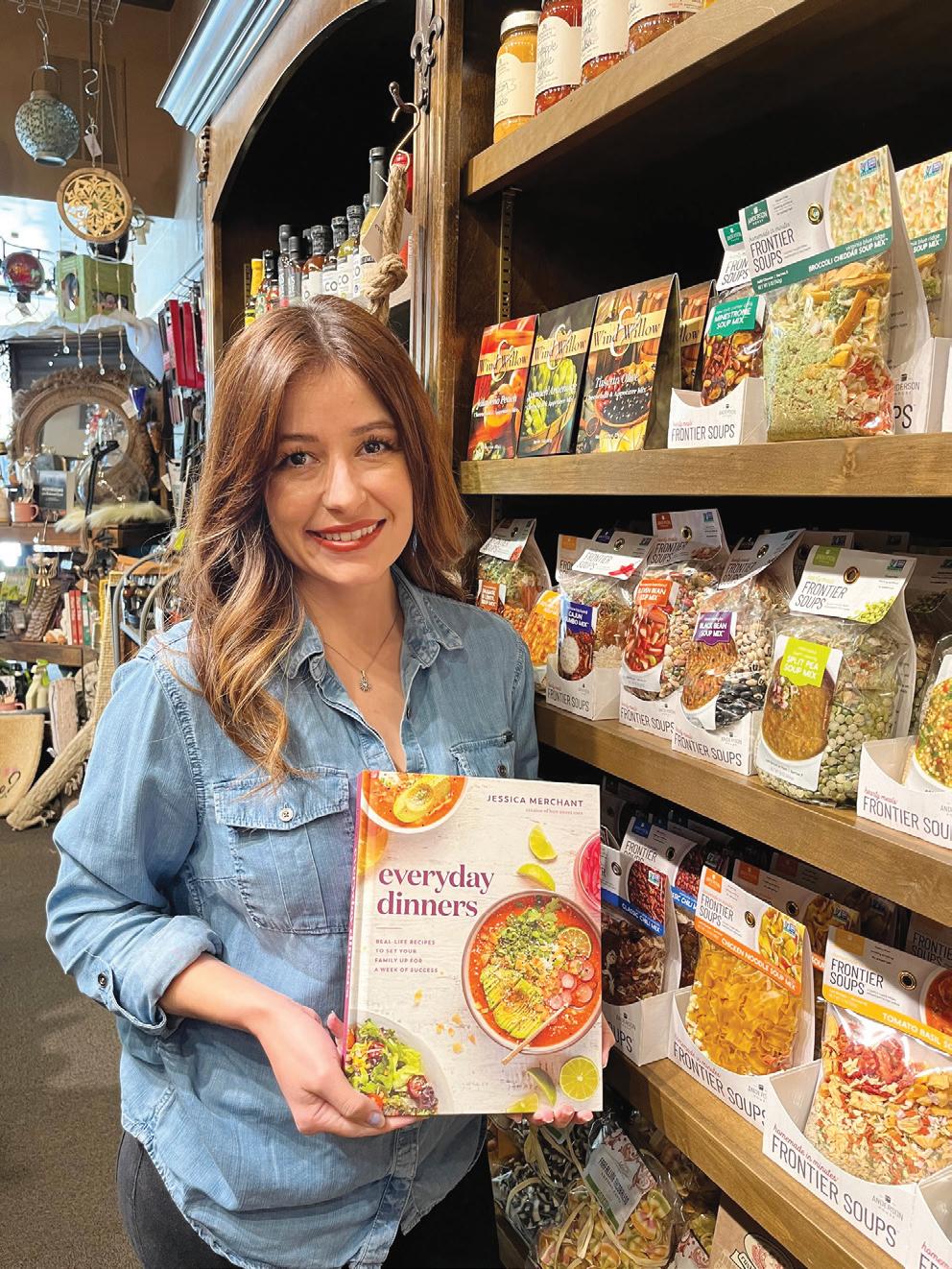




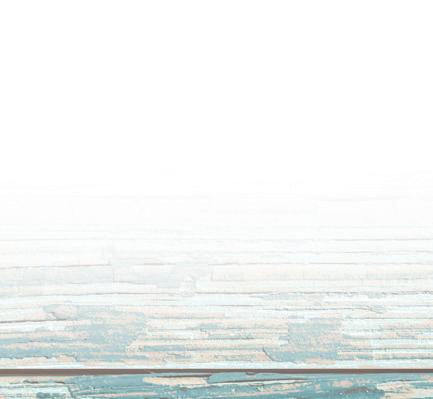























Lifestyle Magazine is rooted in finding inspiration in the everyday. Our homes are a central point of our lives and hold significant moments that can often be overlooked in the business of life. The connections we make with our loved ones remind us that collecting moments and not things is what’s most important. We want to thank you for bringing Lifestyle Magazine into your homes each month and for being a part of what makes our community a great place to live.
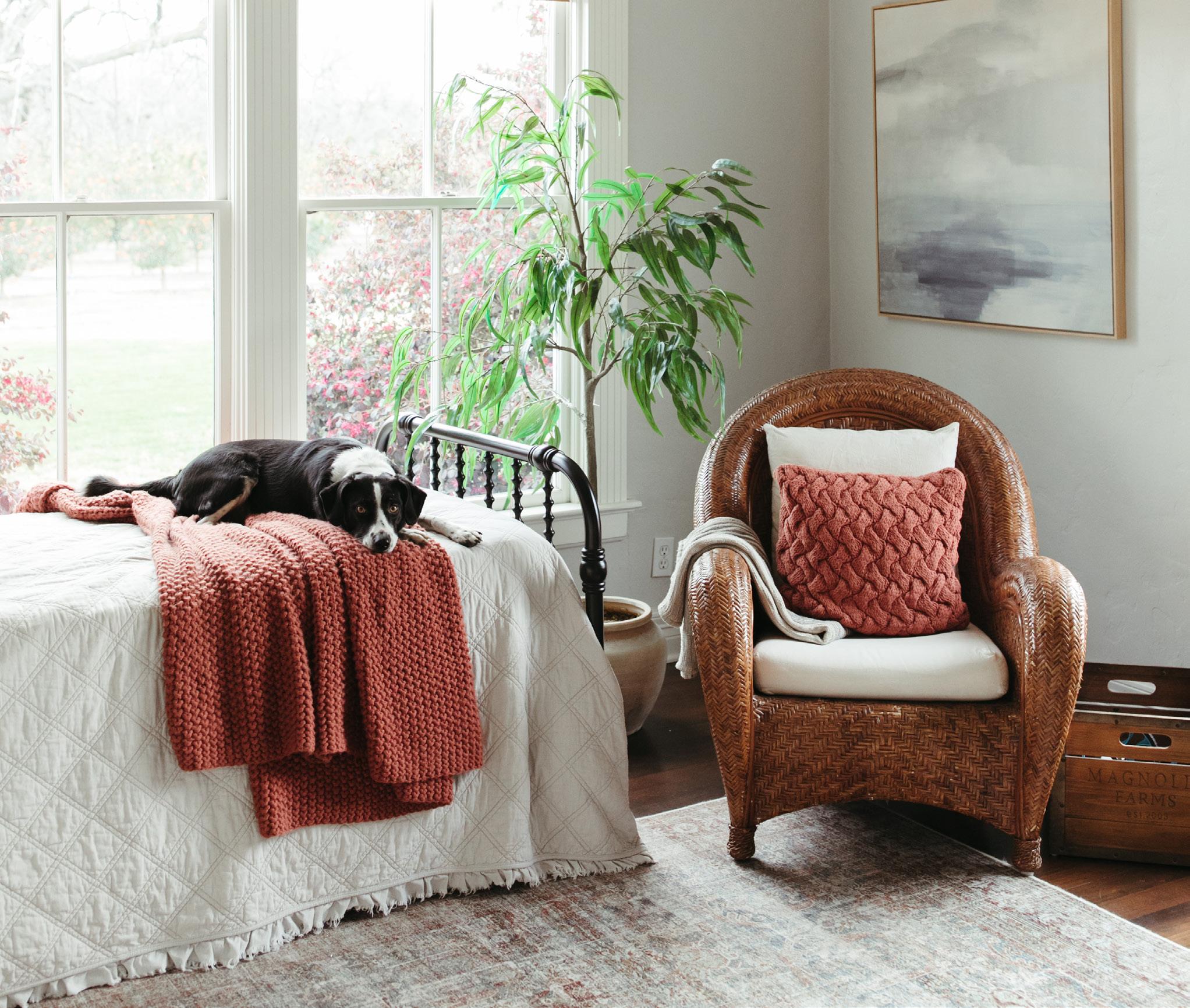
A house is never lonely where a loving pet awaits.
BREAST AUGMENTATION
BREAST REDUCTION

BREAST RECONSTRUCTION



TUMMY TUCK
FACELIFT
LIPOSUCTION


